
- Types Of RVs
- Tow Vehicles
- Maintenance & Repairs
- RV Power & Electrical Supplies
- RV Appliances
- Living In An RV
- Travel & Destinations
- RV Gear Buyer’s Guides
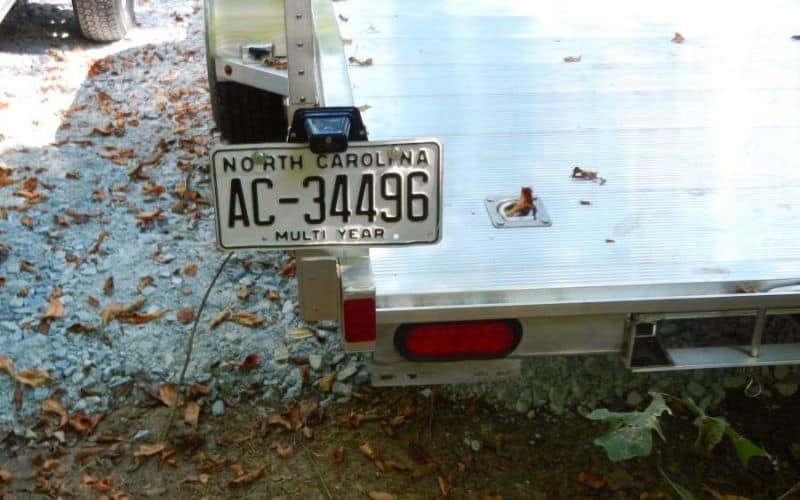

Does My Travel Trailer Need A License Plate?
- Last Updated: March 24, 2024
- 6 minutes read
You might be surprised to hear that each state carries its own specific laws on the types of vehicles, trailers, and towable RVs that need to be licensed and registered to legally travel on public roads. However, almost all require a license for travel trailers and campers.
Making sure that your trailer is properly registered, licensed, and up to date on the tabs might seem like a minor inconvenience that you can put off.
However, the punishment for driving an improperly licensed trailer or a trailer without a license plate in a state that requires them can be stiff.
Though different states have different regulations on the license plate and registration requirements for different types of trailers and towable RVs.
Understanding the requirements in your state and the states you plan to visit with your trailer will go a long way toward avoiding a hefty fine ruining an otherwise amazing vacation.
Do You Need a License Plate for Your Camper or Trailer?
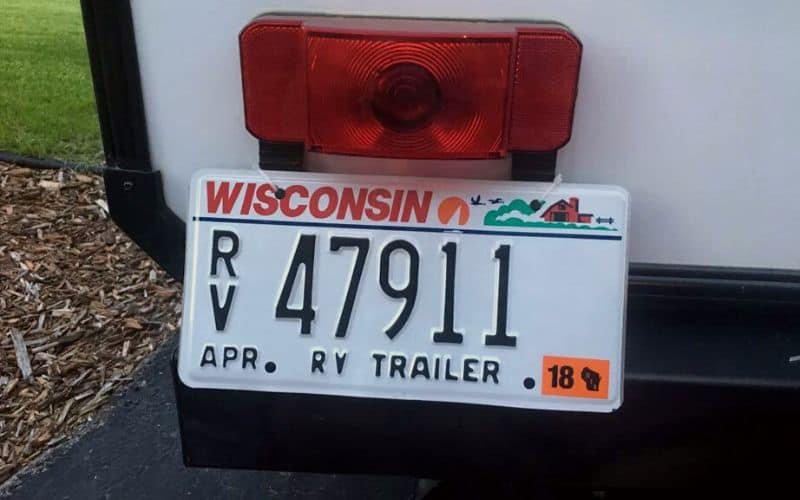
Most states require you to have a license plate on a camper or travel trailer.
Though there might be some exceptions for utility trailers, farm-use trailers, and other functional towable trailers.
Different states might also have different regulations for things like titles, insurance, registration, and license endorsement requirements.
Utility Trailers
Utility trailers and equipment trailers can be enclosed or have an open-top they are typically used to haul small loads and tend to have more relaxed license and registration requirements.
Whether or not you need a license plate depends on the state and what you are hauling. Many states don’t require license plates or minimal plate requirements for farm-use trailers
Does A Pop Up Camper Need A License Plate?
Most states require popup campers to have a license plate. However, a few states might not require titles as popup campers are generally lightweight and smaller.
If you purchase a used popup camper and didn’t receive a title, you will likely need a bill of sale with a Vehicle Identification Number.
Then the Department of Motor Vehicles can order a replacement title for you.
Does A Travel Trailer Need A License Plate?
Almost all states recognize travel trailers as towable RVs and require you to have an up-to-date license plate.
Registration requirements, renewal times, and other regulations vary widely from state to state.
Are There Times When You Don’t Need A License Plate On A Trailer?
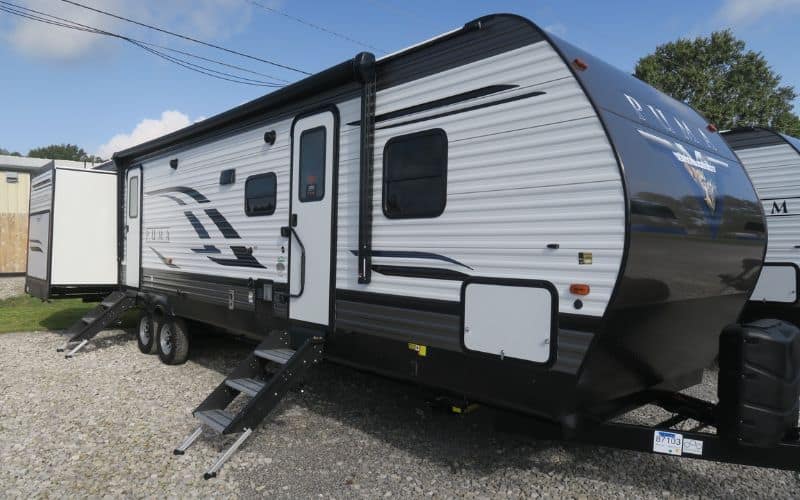
A few rare exceptions and state exemptions allow you to tow your trailer on a public road without a license plate.
Most of the time when you purchase a new trailer it won’t have a license plate.
Most dealerships will give you a temporary plate or a sticker to hang in the rear window that notes the date of purchase and the reason for the license exemption.
A lot of states you up to 30 days to obtain your license for the trailer. If you are pulled over for driving without a license plate, show the bill of sale to prove you’ve recently purchased it.
Farm-Use Trailer Exemptions
A lot of states have license plate exemptions for farm-use trailers. This includes trailers that are being used to haul farming items, such as livestock, produce, or equipment.
Though you should check with your local and state agencies before towing a farm-use trailer on public roads.
How Often Do I Need To Renew My Trailer’s License?
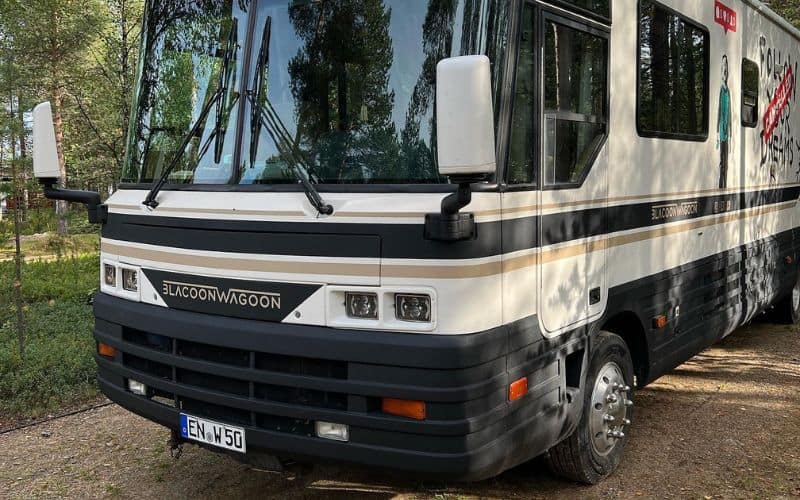
The duration of time between license renewals for a trailer, camper, or towable RV can vary from state to state.
In some states, the renewal is annual; in others, it might be five years. Even a few states like Arizona let you pay a one-time trailer licensing fee.
How Do I Renew The License Registration on My Trailer?
Most states allow you to renew your registration online, by mail, or in person. Renewing online is convenient, though you might expect delays if you need new plates or tabs.
There are also minor fees attached to the shipping costs. A lot of states also charge an additional 3% to 5% processing fee for using a debit or credit card for online purchases.
Do Travel Trailers Have a Title?
A lot of travel trailers need and have a title. Though state title regulations for various types of the trailer can vary.
If you purchased a used travel trailer from a private party and they didn’t have a title, you can get a replacement title through your local DMV .
Though you will likely need to provide the bill of sale as proof of the purchase and all your pertinent documents.
While some states might let you get away with not putting license plates on an equipment trailer or farm-use trailer.
Pretty much all states require you to maintain an active license and registration on RV towable trailers, popup campers, travel trailers, teardrop campers, and the like.
If you buy your trailer new from a dealership, you will have a limited window with which you can legally drive it on the roads without a license plate or active tabs.
Though you will still need to register it within 30 to 60 days of the purchase. At that time, your state’s DMV will start the process of issuing your license plates for the trailer.
Just how often you’ll need to renew the license on your trailer will vary. Some states allow you to pay a one-time fee, whereas others require you to renew the license annually, biannually, or even go as much as five years before requiring renewal.
About Author / Aaron Richardson
Aaron Richardson is an expert RVer and the co-founder of RVing Know How. Aaron, along with his wife Evelyn, has been living and traveling in their Keystone Fuzion RV since 2017. Their adventures span across the country and beyond, including memorable RVing experiences in Mexico. Aaron's passion for the outdoors and RVing shines through in his writings, where he shares a blend of travel stories, practical tips, and insights to enhance the RV lifestyle.

How To Convert Your Generator To Run On Propane
Are dual pane rv windows really worth the money.

Leave a Comment Cancel reply
Your email address will not be published.
Save my name, email, and website in this browser for the next time I comment.
You Might Also Like
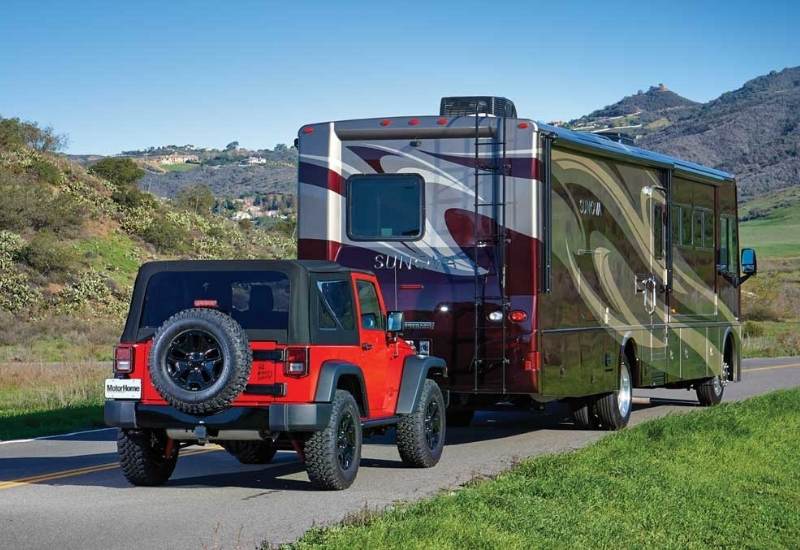
What Jeep Models Can Be Flat Towed Behind An RV?
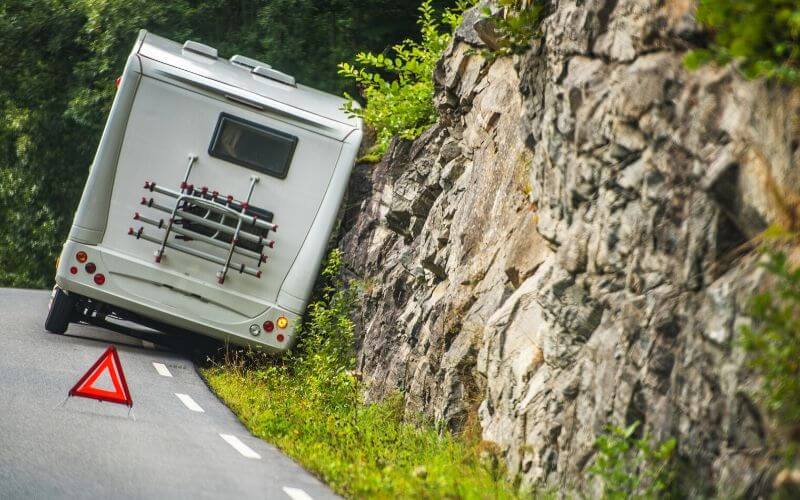
Good Sam Vs. AAA: Which RV Roadside Assistance Is Better and why?
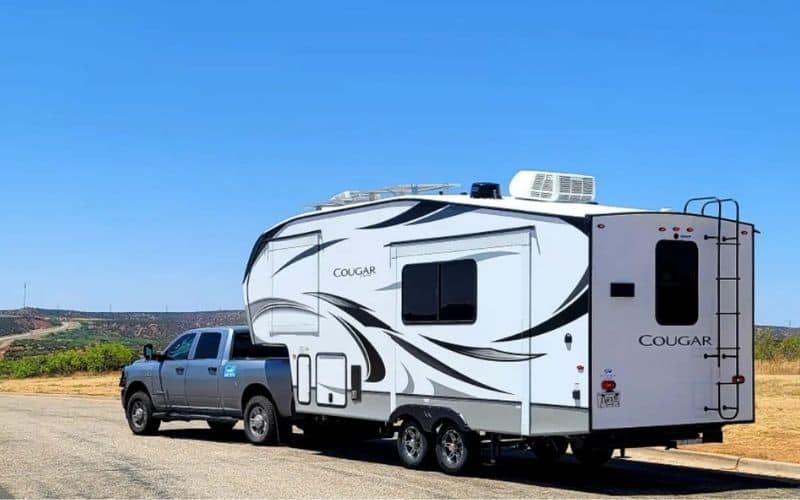
Can You Hire Someone To Tow An RV Trailer For You?
Start typing and press Enter to search
Does a Travel Trailer Need a License Plate?
By: Author The Drivin' & Vibin' Team
Posted on October 22, 2021
Many people are confused about what does and doesn’t need a license plate, especially when it comes to things like a camper trailer.
Registering your newly purchased vehicle is almost a right of passage. But that doesn’t mean the process is easy.
We’ll try to simplify the process and answer all of your questions.
Let’s dig in!
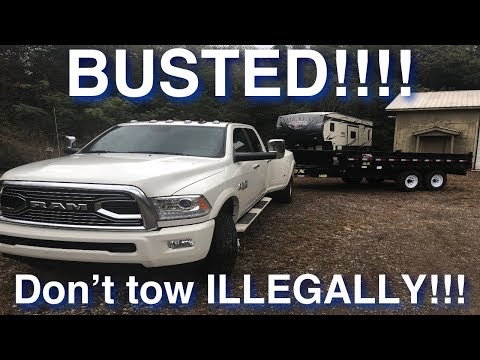
Do You Need a License Plate for Your Trailer?
It depends on state regulations. Each state has its own rules and laws. However, in most cases, you’ll need to license your trailer before driving it around.
Pop-Up Campers
Pop-up campers are typically smaller, lighter campers that are easier to tow. Therefore, you usually need a license plate, but some states may not require titles because they’re smaller. It’s always wise to have a title for your pop-up camper because it shows ownership and proves that you didn’t steal it.
If you didn’t receive a title when you purchased your pop-up camper, you would need a bill of sale with a Vehicle Identification Number. With this information, you can go to the DMV (Department of Motor Vehicles) and order a replacement title.
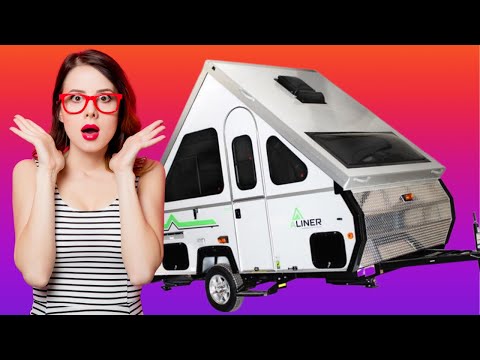
Travel Trailers
A travel trailer is an RV you tow behind another vehicle. In most states, you must license both the travel trailer and your towing vehicle. However, specifics for registration requirements, renewal timelines, and other information can vary from state to state. Therefore, you should always check with your state DMV to understand the regulations for your travel trailer.
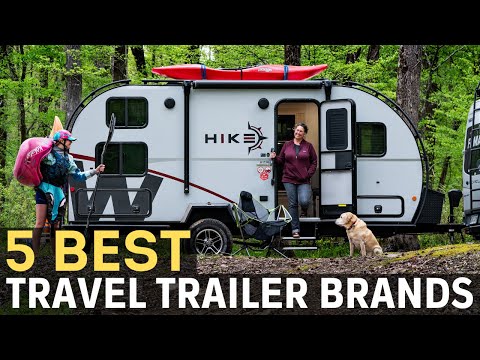
Utility Trailers
Utility trailers are usually open-topped trailers used to haul small loads. They can range in size and shape. Whether a utility trailer needs a license plate depends on each state. What you’re hauling can also affect whether you need a license plate. For example, in some states, trailers used for farming may not require a plate.
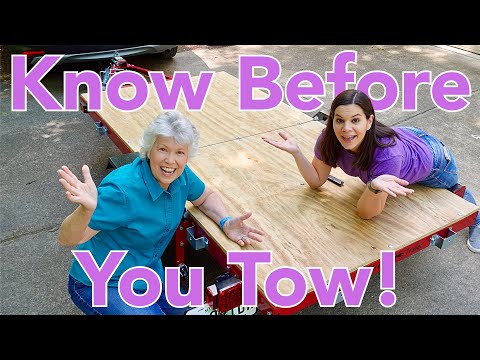
Is It Ever OK to Not Have a License Plate on Your Trailer?
Although having a license plate on your trailer can help avoid problems, there are certain times when you don’t need one.
First, you don’t need to worry about driving your newly purchased trailer without a license plate, especially to take it home after the purchase. Most states give you 30 days to obtain your license. If the police stop you for driving without a license plate, show the bill of sale to prove you’ve recently purchased it.
Another reason that you may not need a license is because of the trailer type. For example, if you use the trailer to haul farming items, such as livestock, produce, or equipment, you may not need a license plate in some states. But, again, you’ll need to check with your local and state regulations to know if this applies to you.
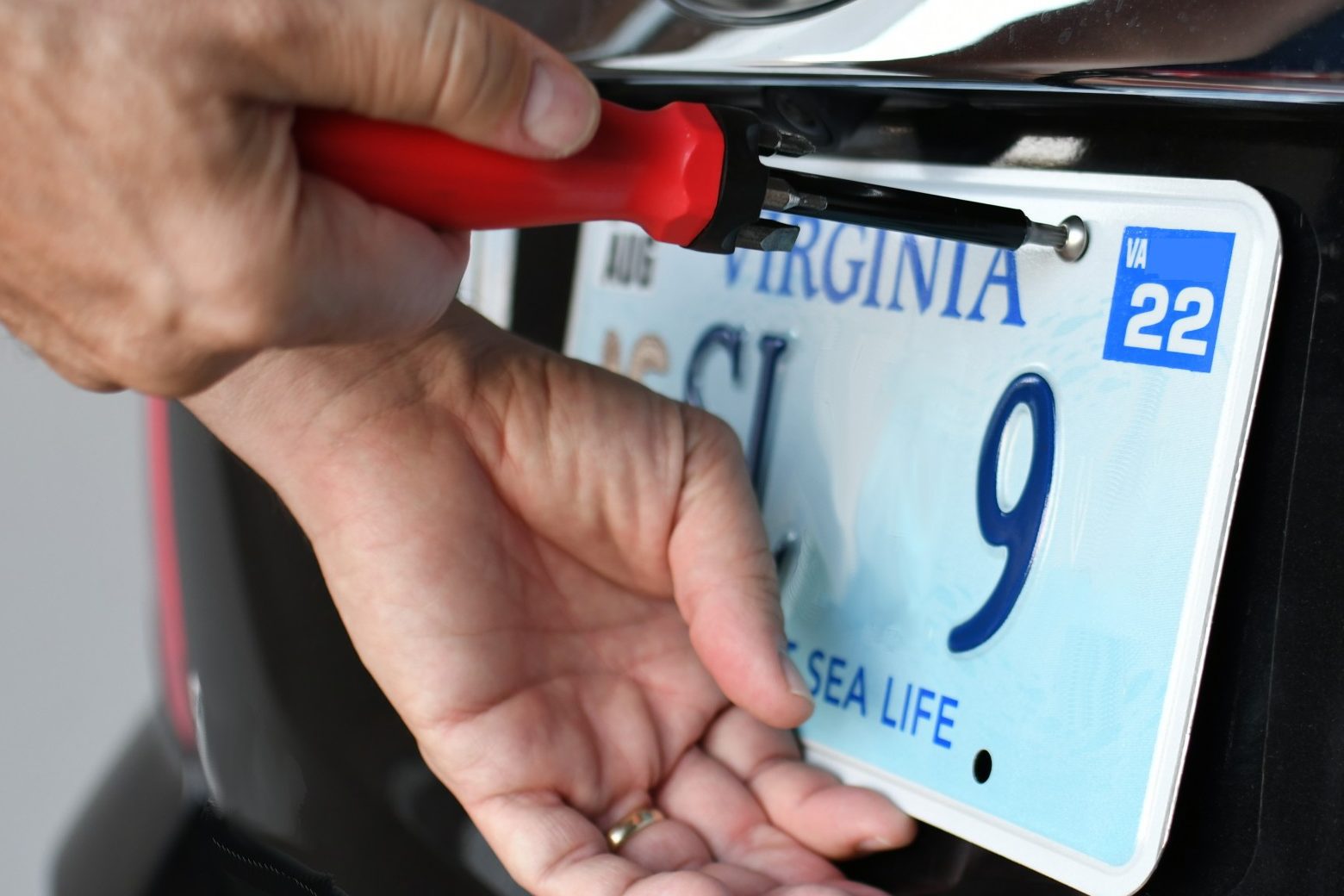
Do You Have to Register Your Travel Trailer Every Year?
Although you only need to replace your plates every five years or more, you must register more often. Many states require annual travel trailer registrations, but this isn’t standard across the board. Therefore, you’ll need to check with your state’s laws.
You can typically renew your registration in three ways: online, by mail, or in person. Although in-person can be convenient if you have questions, it can be inconvenient if you’re out of state when your registration expires. Therefore, the other two options can be more helpful.
But be aware. Although the online option can be faster, you may end up paying fees that you could avoid using the mail-in or in-person route.
Pro Tip: Curious to know what a license plate can tell you about a person? We uncovered Can You Find a Vehicle Owner by License Plate?
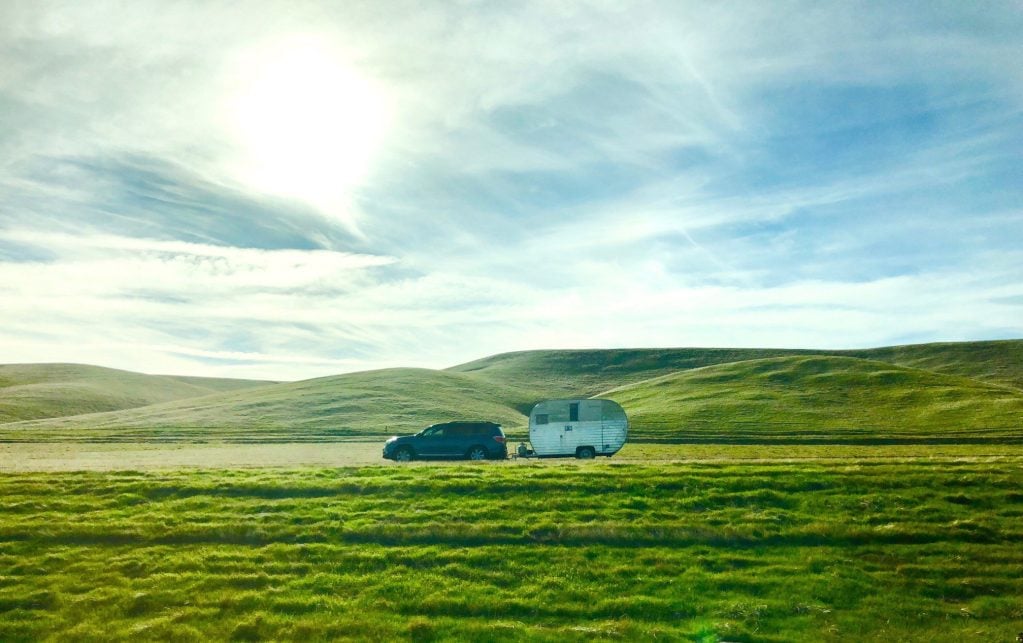
Do Travel Trailers Have Titles?
Most travel trailers need and have a title. However, regulations for trailer titles can vary between states. If your state does require a title, you can obtain it from the DMV. Usually, you can receive a trailer title the same way you’d get a car or truck title.
Pro Tip: If you bought your trailer without a title, here is How to Get a Title for an RV Trailer.
How Do You Get Plates for Your Trailer?
The local, state, or county DMV will distribute your trailer license plates. To obtain your plates, bring several items. First, you’ll need the title, and it must have the necessary signatures. You may also use the bill of sale, but the title will always be the best option.
Other necessary documents may include a signed application for the title and license, proof of trailer insurance, and a receipt of paid personal property taxes. This receipt is most applicable for stationary trailers, but there may be unique situations where your trailer applies. You’ll also need to pay any relevant title and registration fees.
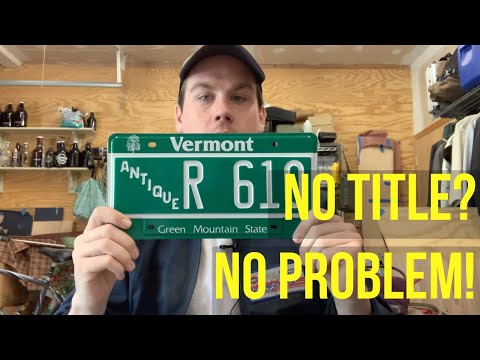
Do a Little Research to Stay Legal
Ultimately, whether or not your trailer needs a license is entirely based on where you reside. Each state has different laws and regulations for licensed vehicles. If you’re unsure, you should contact your DMV. They’ll let you know whether you need a trailer license. Be careful if you’re moving from state to state, as regulations vary. Have you ever had to get license plates for a trailer?
Discover the Best Free Camping Across the USA
To be honest with you, we hate paying for camping . There are so many free campsites in America (with complete privacy).
You should give it a try!
As a matter of fact, these free campsites are yours. Every time you pay federal taxes, you’re contributing to these lands.
Become a FREE CAMPING INSIDER and join the 100,000 campers who love to score the best site!
We’ll send you the 50 Best Free Campsites in the USA (one per state). Access the list by submitting your email below:
Of course it needs a licensed tag there’s no State going to pass up an opportunity to hit you for a few dollars for something I know in Ohio you have to have it weighed if you don’t know the weight and they charge you by the way which is a minimum it looks like of $50
Do golf cart trailers need to have a tag?

RV Registration Rules by State
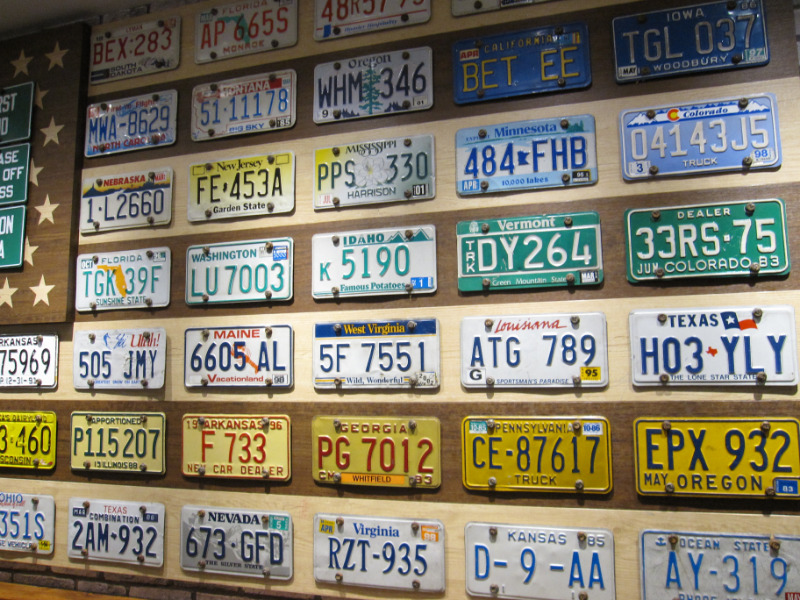
Sharing is caring!
Thanks for your support! If you make a purchase using our links in this article, we may make a commission. And, as an Amazon Associate, I earn from qualifying purchases. See the full disclosure here .
There are few things as exciting as buying a new (or new to you) RV. But before you can start your new RV adventure, there’s one thing you need to do: register your RV. Here are the RV registration rules by state.
No matter what kind of RV you have, you’ll need to register it before you can legally take it on the road. But because the process varies from state to state (and even county to county), things can get confusing. But don’t worry; we’re here to walk you through the process in all 50 states and DC. First, let’s take a look at some common registration questions.
Do RVs and Camper Trailers Need to be Registered Like a Regular Vehicle Does?
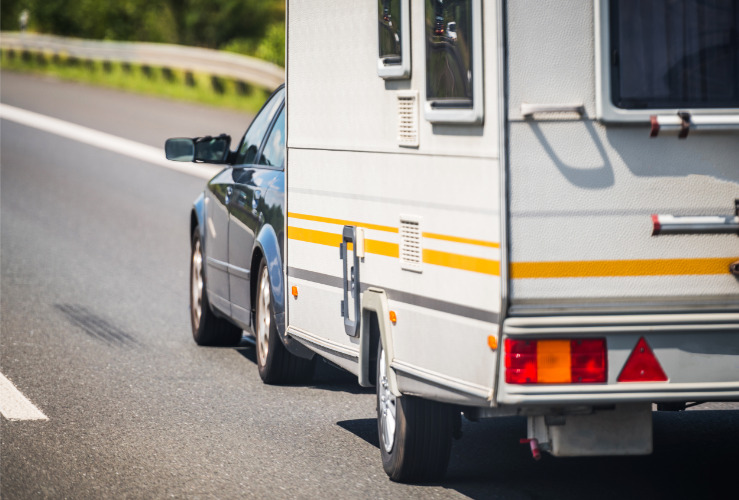
Do RVs need to be registered like your regular vehicle? The short answer is: yes. All 50 states (and DC) require you to register an RV before taking it on the road, just like a regular vehicle.
You’ll need to register your RV whether it’s self-propelled (like a motorhome) or towed by another vehicle (like a travel trailer, fifth wheel, pop-up).
In some cases, trailers are registered slightly differently than other vehicles. But in general, the process is the same for RVs as for anything else on the road.
The main difference between registering an RV and a vehicle is the cost. RVs usually (but not always) pay different fees than other passenger cars.
Do Towable RVs have VIN Numbers?
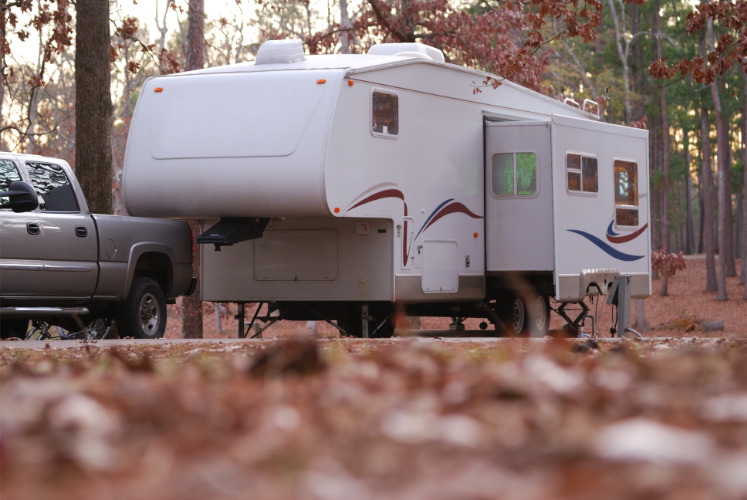
You’ll need to provide your vehicle’s Vehicle Identification Number (VIN) as a part of the registration process. But do towable RVs even have VIN numbers?
Yes, towable RVs like travel trailers and fifth wheels do have a VIN! Even small trailers like pop-up campers will have a VIN.
Their location isn’t standardized, so you might have to hunt a bit to find it. The VIN on a trailer is commonly found:
- Along the tongue of the trailer
- On the frame of the trailer
- Inside the lower corner of one of the exterior sidewalls
- Within the interior cabinets
- Inside of exterior storage areas or compartments
Because the VIN on a towable RV can be hard to find, it’s often easier to check your documentation if you can. A vehicle’s VIN can be found on its title. It is often on the bill of sale as well, but not always.
Do I Need Insurance to Register My RV or Camper?
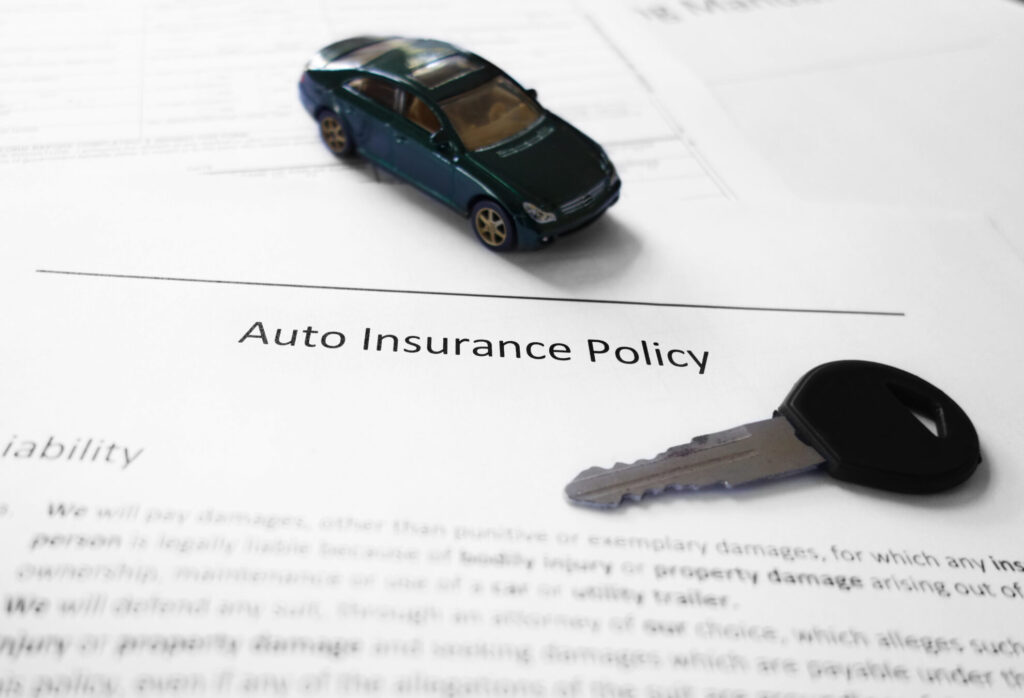
Yes! Just like any vehicle, auto insurance is required if you want to take your RV on the road. Without insurance, you won’t be able to register your vehicle.
However, a towed RV generally doesn’t need its own insurance. Instead, the insurance of your tow vehicle will generally extend to cover the trailer.
The exact requirements will vary from state to state. You’ll need coverage for bodily injury and property damage in every state. But some states also require you to have coverage for personal injury or uninsured/underinsured motorist coverage.
One other thing to note is that if you’re planning to rent your RV for some extra cash, you’ll probably need a slightly different policy. In fact, a typical insurance policy will drop your coverage for lending out your RV to someone else!
To avoid this problem, you can use a policy like this one from Roamly . They have policies that let you rent out your RV without worrying about having your coverage dropped.
Once you buy and register your RV, give RV Trip Wizard a try for all your trip planning needs! We love it and use it almost every day! Use discount code RVBLOGGER and save 25% when you sign up!
RV Registration Rules By State
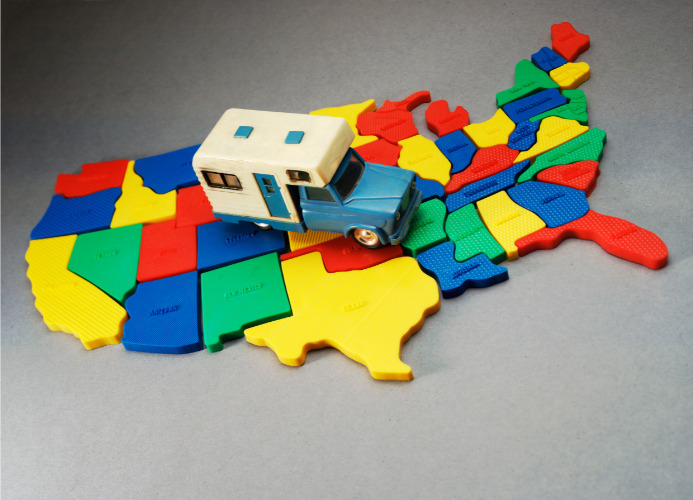
When you register your RV, you’ll generally title your RV at the same time. In the case of private sales, you’ll have to get the title transferred into your name.
In most cases, the registration process will be more or less the same, no matter what kind of RV you have. Usually, you’ll see a self-propelled RV referred to as a “motorhome” by your state’s DMV or other offices. Towable trailers are referred to by various names such as travel trailers, camper trailers, or recreational trailers.
In almost every state, you can go in person to register your RV. Some states also allow you to register by mail and a few let you register completely online. In many states, if you buy from a dealer, they can handle the title and registration on your behalf.
States usually give you a certain time period to register your vehicle after purchasing one or moving to the state. If you miss this time period, you’ll usually have to pay extra fees as a penalty.
Every state handles its registration fees differently, and fees will also often be different from county to county. In some cases, the state and/or county will provide a fee schedule or calculator. But in other cases, you’ll have to contact the relevant authority directly to find out the exact fees.
Now that we’ve covered the basics, let’s look at the different requirements to register an RV in all 50 states and DC!

You’ll have to register your RV within 20 days of purchase in Alabama . You’re responsible for registration whether you buy through a dealer or a private sale.
Just moved to the “Heart of Dixie?” New Alabama residents have 30 days to register.
In Alabama, you’ll register your RV in person at your local county registration office . It’s important to note that Alabama tags are renewed every year (so plan accordingly).
There are a couple of exceptions to registering your RV in Alabama though:
- You do not have to register travel trailers older than 20 years.
- Vehicle more than 35 years old also don’t have to be registered.
Alabama has the following coverage requirements for auto insurance:
- Bodily injury liability: $25,000 per person; $50,000 per accident
- Property damage liability : $25,000 per accident
- Uninsured/underinsured motorist coverage: $25,000 per person; $50,000 per accident
The Alabama registration fee for your RV will be based on weight. The fee starts at $23 for vehicles under 8,000 pounds and goes up to $890 for vehicles over 80,000 pounds. Travel trailers pay a flat $12 registration fee.

In Alaska, registering your RV is your responsibility whether it’s from a dealer or a private sale. If you’ve just moved to the “Last Frontier,” new Alaska residents have to register within only 10 days of arriving in the state!
RV registration is done in person at your local DMV office and Alaska tags are renewed every two years. However, vehicles over 8 years old can be permanently registered .
Alaska has the following minimum coverage requirements for auto insurance:
- Bodily injury liability: $50,000 per person; $100,000 per accident
- Property damage liability: $25,000 per accident
The base fee to register is $100 for a motorhome and $30 for a trailer. You might have to pay extra fees depending on where you live as well. For example, residents of Anchorage pay an extra $110 to register their motorhome.
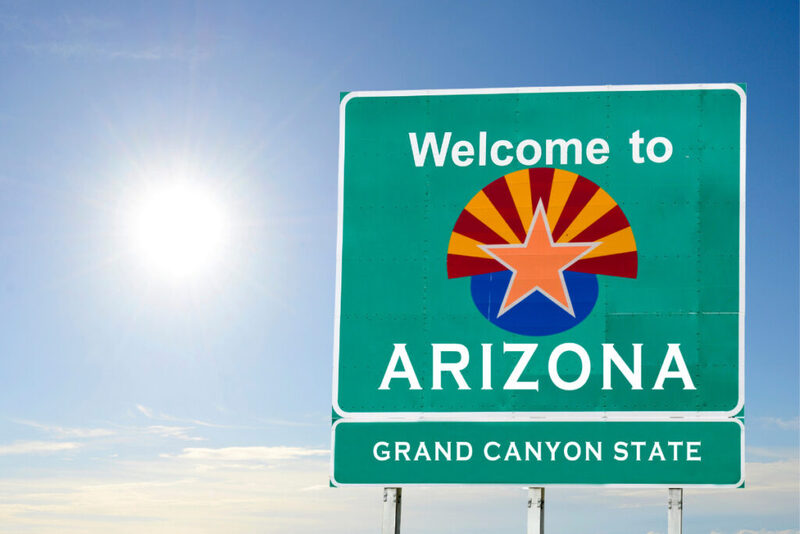
You must register your RV within 15 days of purchase in Arizona. You’re responsible for handling the registration whether you buy from a dealer or a private sale. New Arizona residents must register as soon as they establish residency.
In the “Grand Canyon State”, you’ll register your RV in person at your local Motor Vehicle Division office . You can register for one, two, or five years at a time which is convenient if you’ll be on the road.
Keep in mind, you may be required to do an emissions test before registering your RV. This is required for any vehicle more than 5 years old unless it was made before 1967.
Arizona has the following coverage requirements for auto insurance :
- Property damage liability: $15,000 per accident
You’ll pay $13.50 in registration fees , plus a vehicle license tax (VLT). The VLT is based on the value of the vehicle and the amount of the VLT goes down every time you renew.
Whether you buy through a dealer or a private sale, you’ll have to handle the registration yourself within 30 days of purchase in Arkansas. New residents of the “Natural State” also have 30 days to register.
Registration is done completely online through the Arkansas My DMV website . This is a convenient method because Arkansas tags are renewed every year.
Arkansas has the following minimum coverage requirements for auto insurance:
Registration fees are based on vehicle type and weight:
- $17 for motorhomes under 3,000 pounds
- $25 for motorhomes between 3,001 and 4,500 pounds
- $30 for motorhomes over 4,500 pounds
Trailers are registered permanently for a flat $36 fee. There is also a $2.50 validation decal fee and a $10 title fee.
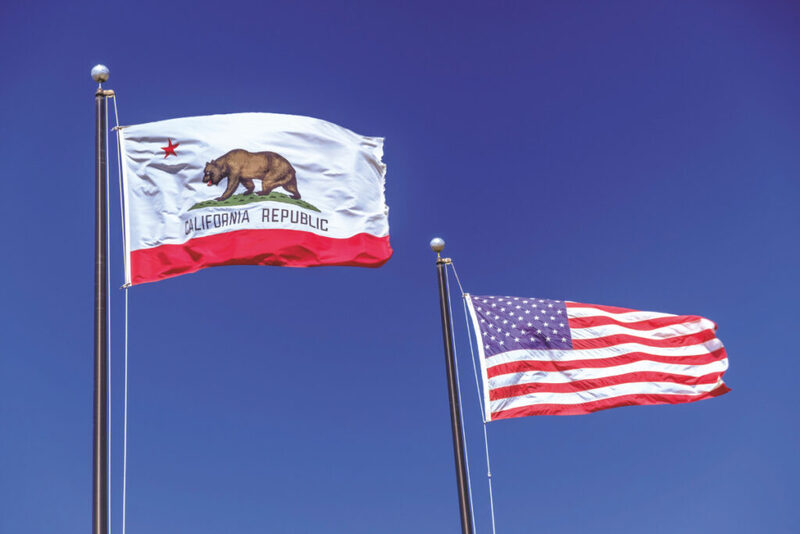
If you’ve completed a private RV sale in California, you’ll need to register your RV within 10 days of purchase in the “Golden State”. If you buy through a dealer, they’ll usually take care of the registration for you . Just moved? New California residents have 20 days to register their RVs.
Within California, you’ll register your RV in person at your local DMV office . California tags are renewed every year. An added step is that your RV may need to pass a smog inspection to be registered.
California has the following minimum coverage requirements for auto insurance:
- Bodily injury liability : $15,000 per person; $30,000 per accident
- Property damage liability : $5,000 per accident
California vehicle registration fees are fairly complicated. They’re based on your vehicle type, purchase price, weight, where you live, and more. There are also other fees to pay like the California Highway Patrol fee and the transportation improvement fee.
To help you figure out your fees, California has a fee calculator for both new vehicles and used vehicles .

You have 60 days to register your RV after you buy it in Colorado. New residents to the “Centennial State” have 90 days to register!
Registration can be done online at the Colorado DMV website or in person at your local DMV office . However, if you live in Crowley or Hinsdale county, you cannot register online – you’ll have to go in person. Colorado RV tags are renewed every year.
Colorado has the following minimum coverage requirements for auto insurance:
- Property damage liability: $15,000 per accident
Registration fees in Colorado are based on a number of factors like your vehicle’s type, weight, and purchase price. The exact calculation depends on what county you live in .
Connecticut
In Connecticut, registering your newly purchased RV is your responsibility in the “Constitution State”. Connecticut’s DMV doesn’t specify a timeframe for registering a newly purchased vehicle. However, new residents have 90 days to register .
You can only register in person at a DMV office and you’ll need to make an appointment . Connecticut tags are renewed every three years.
Keep in mind that you won’t be able to register your RV if you have unpaid property taxes or parking tickets. You’ll also have to meet Connecticut’s emissions testing requirements to be able to register.
Connecticut has the following minimum coverage requirements for auto insurance:
Connecticut lists the following registration fees for motorhome registration:
- $112.50 Registration Fee
- $5.00 Plate Fee
- $15.00 Clean Air Act Fee
- $10.00 Greenhouse Gas Fee
- $10.00 Administrative Fee
- $25.00 Title Fee
- $10.00 Lien Fee (if applicable)
- $15.00 Passport to Parks Fee
For a trailer, the fees are:
- $28.50 Registration Fee
- $5.00 Plate Fee
- $25.00 Title Fee (if the GVWR is more than 3000 pounds)
- $10.00 Administrative Fee

If you live in the “First State,” you must register an RV within 30 days of purchasing it in Delaware. Whether you buy from a dealer or a private sale, registration is your responsibility. New Delaware residents have 60 days to register.
Registration is done in person at your local DMV office . Delaware tags are renewed every year. Plus, your RV will have to pass a safety and emissions inspection to be able to register.
Delaware has the following minimum coverage requirements for auto insurance:
- Property damage liability: $5,000 per accident
- Personal injury protection: $15,000 per person; $30,000 per accident
Registration fees are based on weight and vehicle type. RVs under 5,000 pounds cost $40 to register. For every 1,000 pounds over 5,000, you’ll pay an extra $6.40.
Trailers are $15 under 1,000 pounds; $20 between 1,001 and 2,000 pounds; $40 from there up to 5,000 pounds. For every 1,000 pounds over 5,000, you’ll pay another $18.
A newly purchased RV in Florida should be registered within 30 days of purchase. Like in many other states, an authorized dealership can handle the registration process for you. New residents of the “Sunshine State” have just 10 days to register their vehicles.
You’ll register in person at your local tax collector’s office . Florida tags are renewed every year.
Florida has the following minimum coverage requirements for auto insurance:
- Bodily injury liability: $10,000 per person; $20,000 per accident
- Property damage liability: $10,000 per accident
- Personal injury protection: $10,000 per person
- Uninsured motorist coverage : $10,000 per person; $20,000 per accident
To register your RV in Florida, you’ll have to pay a $225 initial registration fee the first time you register, plus $28 for your license plate. You will also have to pay other fees based on your vehicle’s weight, type, and use.

Welcome to Georgia! If you purchased an RV at a dealer in the “Peach State,” you have 30 days to register a vehicle – but the dealer is able to do this for you! For a private sale, you’ll have to register your RV within seven business days . New Georgia residents have 30 days to register.
You’ll register in person at your local county tag office . Georgia tags are renewed every year.
Georgia has the following minimum coverage requirements for auto insurance:
- Property damage liability: $25,000 per person
There are a number of fees you might have to pay. Most commonly, you’ll pay $18 for the title application as well as the title ad valorem tax ( TAVT ). The TAVT is 6.6% of the fair market value of your vehicle or 3% for new Georgia residents.
Aloha and welcome to Hawaii!
Each of Hawaii’s counties has its own registration process for registering an RV. But the process doesn’t vary too much between them.
In the “Aloha State,” a dealership will usually handle the registration for you. For a private sale, you’ll have 30 days to register. New residents of Hawaii also have 30 days to register. Hawaii tags are renewed every year.
You’ll have to register in person at the appropriate office depending on your county. You can find more info on your county’s website:
- Hawaii County
- Honoulu County
- Kauai County
- Maui County
Before you can register your RV, it will have to undergo a safety inspection. These can be done at a gas station or mechanic.
Hawaii has the following minimum coverage requirements for auto insurance:
- Bodily injury liability coverage: $20,000 per person; $40,000 per accident
- Property damage liability coverage: $10,000
- Uninsured/underinsured motorist coverage: $20,000 per person; $40,000 per accident
Registration fees are based on your vehicle’s weight. The exact amount you’ll pay depends on the county and will be given to you at the DMV.
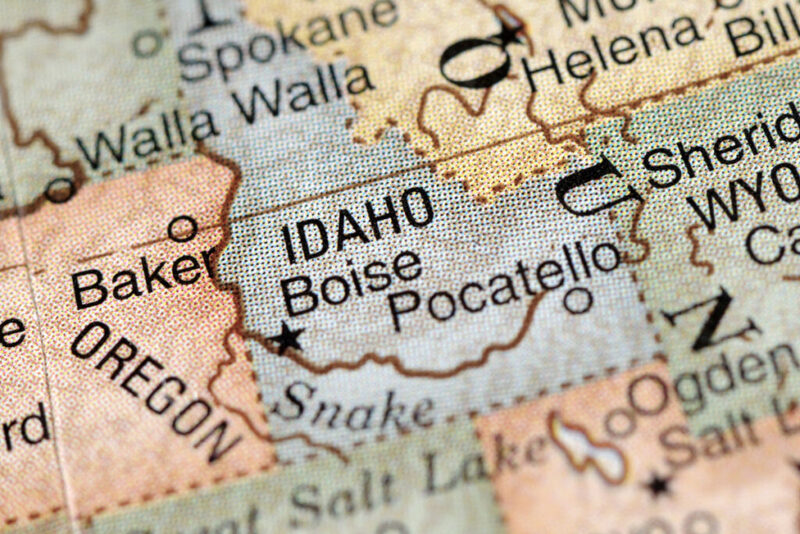
In Idaho, if you buy your RV from a dealership, they’ll usually handle the registration process for you. If not, or if you do a private sale, you’ll have 30 days to register. New “Gem State” residents have 90 days to register.
Registration is done in person at your local DMV office and Idaho tags are renewed every year.
Idaho has the following minimum coverage requirements for auto insurance:
- Property damage liability: $15,000 per person
Registration fees for RVs are based on market value.
…Fees start at $8.50 for the first $1,000 of market value, plus $5 for each additional $1,000 of market value. Idaho DMV’s registration fact sheet
A motorhome’s value will be calculated based on 25-60% of its full value. The percentage depends on the type of motorhome:
- Class C – 50%
- Class A – 60%; front engine diesel – 45%; rear engine diesel – 58%
- Van conversions or Class B – 25%
The value of a towable RV is based on 100% of the value.
On top of the value fee, there’s also an extra $4 registration fee.
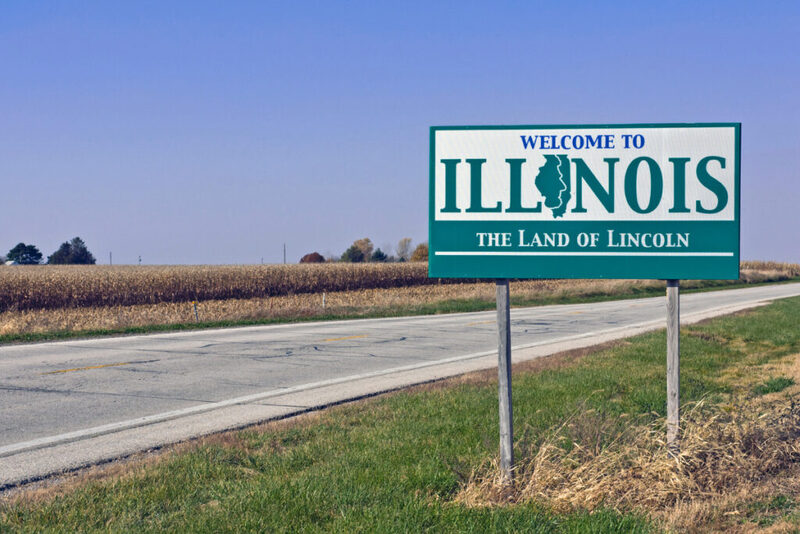
In Illinois, all vehicles have to be registered within 20 days of purchase. If you buy from a dealer in the “Land of Lincoln,” (it’s a sore subject to mention that he was born and raised in Kentucky) they are required to handle this for you, but if it’s a private sale, it’s your responsibility. New residents in Illinois have 30 days to register.
You can register by mail or in person at your local Secretary of State office . Illinois tags are renewed every year.
Illinois has the following minimum coverage requirements for auto insurance:
- Property damage liability: $20,000 per person
Registration fees are based on the weight of your RV. For motorhomes, fees range from $78 to $102; for trailers, they range from $18 to $50. You will also have to pay a $150 title fee.
If you buy an RV from a dealership in Indiana, the dealer will usually handle the registration for you. For a private sale, you can register online up to 45 days after purchase; after that point, you’ll have to go in person. New “Hoosier State” residents have 60 days to register and must do so in person.
You can make an appointment at the branch nearest you through the Indiana.gov website. Indiana tags are renewed every year.
Indiana has the following minimum coverage requirements for auto insurance:
- Uninsured/underinsured motorist bodily Injury: $25,000 per person; $50,000 per accident
- Uninsured motorist property damage: $25,000 per accident
The registration fee for an RV in Indiana is $29.35. You’ll also have to pay various state, county, and possibly municipal taxes.
In Iowa, if you buy your RV through a dealer, they can handle the registration process for you. New residents to the “Hawkeye State” have 30 days to register.
Registration is done in person at your local county treasurer’s office and Iowa tags are renewed every year.
Iowa has the following minimum coverage requirements for auto insurance:
- Bodily injury liability: $20,000 per person; $40,000 per accident
Registration fees for RVs are based on class, how old the model year is, and in the case of class A RVs: the suggested retail price. The price ranges for each class are Class C: $80 to $110; Class B: $65 to $90; Class A: $85 to $400.
The fees for travel trailers are based on square footage and age. Trailers between 1 and 6 years old pay $0.30 per square foot. If the trailer is any older than that, you’ll pay 75% of this rate.

Any RV bought in Kansas should be registered within 60 days of purchase. If you buy through a dealership, they can handle this for you. New “Sunflower State” residents have 90 days to register.
Registration is done in person at your local county treasurer’s office . Kansas tags are renewed every year.
Kansas has the following minimum coverage requirements for auto insurance:
- Uninsured/underinsured motorist liability: $25,000 per person; $50,000 per accident
- Personal injury protection: $4,500 per person for medical expenses; $900 per month for one year for disability/loss of income; $25 per day for in-home services; $2,000 for funeral/burial/cremation expenses; $4,500 for rehabilitation expenses
Registration fees will depend on the county you live in. Contact your local county treasurer’s office to get an estimate of the fees you’ll owe.

Whether you just bought or are a new resident, Kentucky doesn’t give a specific timeframe to register your RV. But, you’ll still need to complete this process before you can get on the road.
Registration is done in person at your local county clerk’s office . “Bluegrass State” tags are renewed yearly.
Kentucky has the following minimum coverage requirements for auto insurance:
Kentucky will also allow you to have a single policy with a limit of $60,000 in lieu of these coverages.
Registration fees will depend on your county. You’ll need to contact your local county clerk’s office for exact fees and taxes.

In Louisiana, you have to register your RV within 40 days of purchase which can be done by a dealer if you buy through a dealership. New residents of the “Pelican State” have 30 days to register.
Registration can be done by mail or in person at your local Office of Motor Vehicles . In Louisiana, motorhome tags are renewed every two years. Trailers can be registered for 1 year, 4 years, or permanently.
Louisiana has the following minimum coverage requirements for auto insurance:
- Bodily injury liability: $15,000 per person; $30,000 per accident
Registration fees in Louisiana depend on the type and value of your vehicle. For a motorhome, some common fees include:
- $68.50 title fee
- $8.00 handling fee
- $50.00 registration fee
Additionally, you’ll pay 0.1% of your vehicle’s value per year of registration. The exact fees and taxes you pay will depend on where you live. Contact your local OMV office to get a more exact estimate.
In Maine, a dealership cannot complete your RV registration for you. It’s your responsibility to register your vehicle whether it’s from a dealership or a private sale. For new “Pine Tree State” residents, you have 30 days to register your vehicle.
The Maine Bureau of Motor Vehicles gives specific instructions for registering both camper trailers and motorhomes on their website.
Registration is done in person at your local municipal office if your municipality participates in the registration program. If they don’t, you’ll have to go to a BMV branch office . Maine tags are renewed yearly.
Maine has the following minimum coverage requirements for auto insurance:
- Uninsured/underinsured motorist coverage: $50,000 per person; $100,000 per accident
- Medical payments coverage: $2,000 per person
Maine RV registration fees are based on the type of vehicle and weight. Motorhome registration fees in Maine start at $21 and go up from there. For trailers up to 2,000 pounds, the cost is $21 to register and $40 if it’s over 2,000 pounds.
In Maine, you will also have to pay the excise tax for your vehicle. You can get more information from your local municipal office.
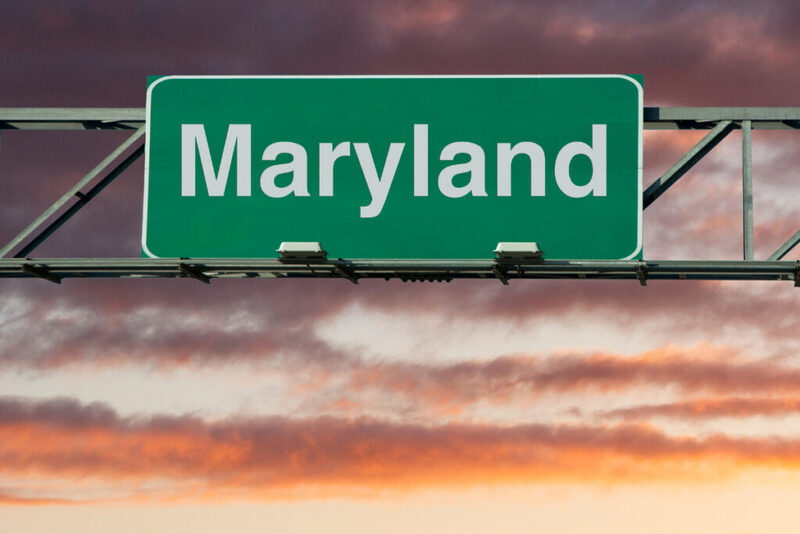
Home to Chesapeake Bay, blue crabs, the city of Baltimore, and RVBlogger- Welcome to Maryland! If you buy an RV from a dealership in the “Free State,” the dealer will usually complete the registration process for you. If you’re a new Maryland resident , you have 60 days to register your rig.
New residents can complete their registration by mail. In other situations, you’ll have to go make an appointment at your local Motor Vehicle Administration office. Maryland tags can be registered for one or two years at a time.
Used vehicles will need to pass a vehicle inspection to be able to register.
Maryland has the following minimum coverage requirements for auto insurance:
- Bodily injury liability: $30,000 per person; $60,000 per accident
Maryland RV registration fees are based on the vehicle type and weight. For a motorhome, you’ll pay $135 if it’s under 3,700 pounds and $187 if it’s over. For a trailer, the fees are:
- 3,000 pounds or less – $51
- 3,001 pounds to 5,000 pounds – $102
- 5,001 pounds to 10,000 pounds – $160
- 10,001 pounds to 20,000 pounds – $248
You also may have to pay a 6% excise tax on your vehicle.
Massachusetts

In Massachusetts, a dealership cannot complete your RV registration for you, so you’ll have to complete the registration yourself . New Massachusetts residents should register as soon as they establish residency.
Registration is done in person at your local Registry of Motor Vehicles office and you’ll have to make an appointment first. The “Bay State’s” tags are renewed every one or two years, depending on the type of plate.
Massachusetts has the following minimum coverage requirements for auto insurance:
- Personal injury protection: $8,000 per person, per accident
- Uninsured motorist coverage : $20,000 per person; $40,000 per accident
Massachusetts RV registration fees are based on vehicle type and, sometimes, weight. A motorhome is registered as an “auto home” and the fee is $50. For trailers, you will be charged $20 for every 1,000 pounds of weight.

If you purchase your RV in Michigan, you must register it within 15 days. If you buy from a dealership, they’re required to process this for you. New residents of the “Great Lakes State” are required to register their rigs immediately.
Registration is done in person at your local Secretary of State branch office . You can schedule an appointment, but it’s not required. Michigan tags are renewed every year.
Michigan has the following minimum coverage requirements for auto insurance:
- Personal injury protection: $250,000 per person per accident
- Property protection: $1 million
- Uninsured motorist bodily injury : $20,000 per person; $40,000 per accident
Michigan RV registration fees are based on the manufacturer’s suggested retail price for the vehicle; for trailers, it is based on the weight. There’s a fee calculator to help you estimate on the Michigan Department of State website.
If you purchase an RV from a dealership in Minnesota, the dealer can register your vehicle for you. New residents of the “North Star State” should register their RV within 60 days of making the move.
Registration can be done by mail or in person at your local Driver & Vehicle Services office .
Minnesota has the following minimum coverage requirements for auto insurance:
- Personal injury protection: $40,000 per person per accident
- Uninsured/underinsured motorist bodily injury : $25,000 per person; $50,000 per accident
Minnesota RV registration fees are $15.50 for both RVs and trailers. You’ll also have to pay a registration tax based on the age and value of your vehicle. To get more information on this tax, you can contact your local deputy registrar.
Mississippi
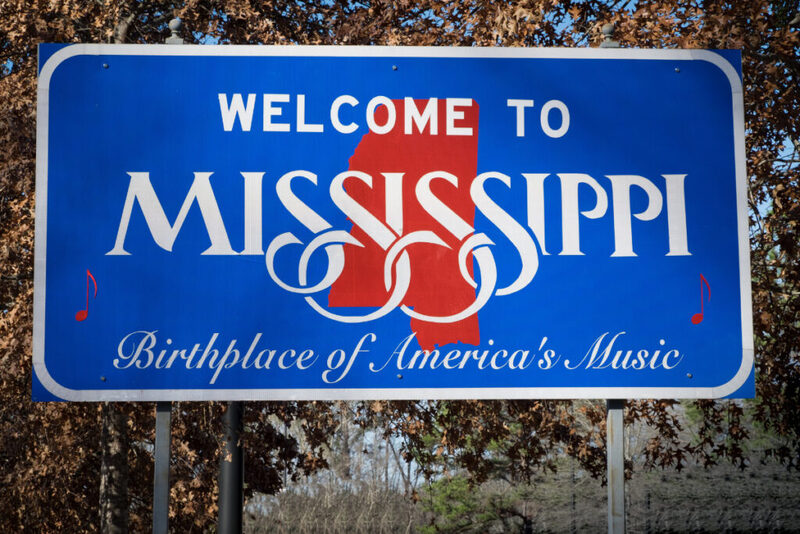
If you purchase an RV from a dealer in Mississippi, they’ll handle the registration for you. Private sales should be registered within seven business days. New residents of the “Magnolia State” have 30 days to register.
Vehicle registration in Mississippi is handled by the Mississippi Department of Revenue. You’ll register your RV in person at your local tax collector’s office. Mississippi tags are renewed yearly.
Mississippi has the following minimum coverage requirements for auto insurance:
To register your RV in Mississippi, you’ll pay a $12.75 registration fee, as well as various taxes. Taxes are based on the type and value of your vehicle and where you live.

In Missouri, your RV must be registered within 30 days of purchase. If it’s a sale through a dealership, the dealer cannot do this for you. New Missouri residents also have 30 days to register.
Registration is done in person at your local license office . The “Show Me State” tags are registered for one or two years at a time. Your RV may need to complete a safety inspection to be registered.
Missouri has the following minimum coverage requirements for auto insurance:
- Uninsured motorist coverage: $25,000 per person; $50,000 per accident
The registration fee for RVs in Missouri is $32.25 plus a $6 processing fee per year. So, if you register your RV for two years, you’ll pay $64.50 plus a $12 processing fee.
Trailers can be registered for one year, three years, or permanently. The costs are:
- $7.50 for one year
- $22.50 for three years
- $52.50 for a permanent registration
You may also have to pay certain taxes when you register your RV. The Missouri Department of Revenue has a tax calculator you can use to estimate this.
When you purchase an RV from a dealership in Montana, the dealer can start the registration process for you. However, you’ll still have to complete the registration yourself. If you’re a new resident to the “Big Sky Country State,” you’ll have 60 days to register.
Registration is done in person at your local county treasurer’s office . You can register your RV for one or two years at a time. If you have a motorhome that’s over 11 years old or any travel trailer, permanent registration is also available.
Montana has the following minimum coverage requirements for auto insurance:
- Property damage liability: $20,000 per accident
Montana RV registration fees for motorhomes are based on the age of the vehicle. The fee schedule is:
- Less than 2 years old – $282.50
- Between 2 and 5 years old – $224.25
- Between 5 and 8 years old – $132.50
- 8 years old or older – $97.50
- 11 years old or older (permanent registration) – $237.50
There is an additional 3% administrative fee on these amounts. You’ll also be charged $25.75 in other fees.
For travel trailers, the registration fee is based on length. You’ll pay $72 for TTs under 16 feet and $152 travel trailers over 16 feet.
Welcome to Nebraska! You’ll have to register your RV within 30 days of purchase in the “Cornhusker State,” whether it’s from a dealer or a private sale. The dealership won’t do this for you. New residents of the cornhusking state also have 30 days to register.
Registration can be done by mail or in person at your local County Treasurer’s office . Nebraska tags are renewed yearly.
Nebraska has the following minimum coverage requirements for auto insurance:
- Uninsured/Underinsured motorist coverage: $25,000 per person; $50,000 per accident
To register an RV in Nebraska, you’ll have to pay $23.80 in registration fees , plus a “motor vehicle fee” and a “motor vehicle tax”. For motorhomes and trailers, these fees are based on weight and age.
If you buy an RV from a dealership in Nevada, you can register it completely online. This should be done before your temporary placard expires. If you go through a private sale, you have 30 days to register your rig in the “Silver State.”
Registration is done in person at your local DMV office and you’ll need to make an appointment to register. Nevada tags are renewed yearly. Prior to registering your RV, your rig may be required to do an emissions test .
Nevada has the following minimum coverage requirements for auto insurance:
In Nevada, you’ll pay a $33 registration fee for a motorhome or $27 for a trailer, plus some other fees and taxes. The Nevada DMV has a fee calculator to estimate the exact amount you’ll pay.
New Hampshire
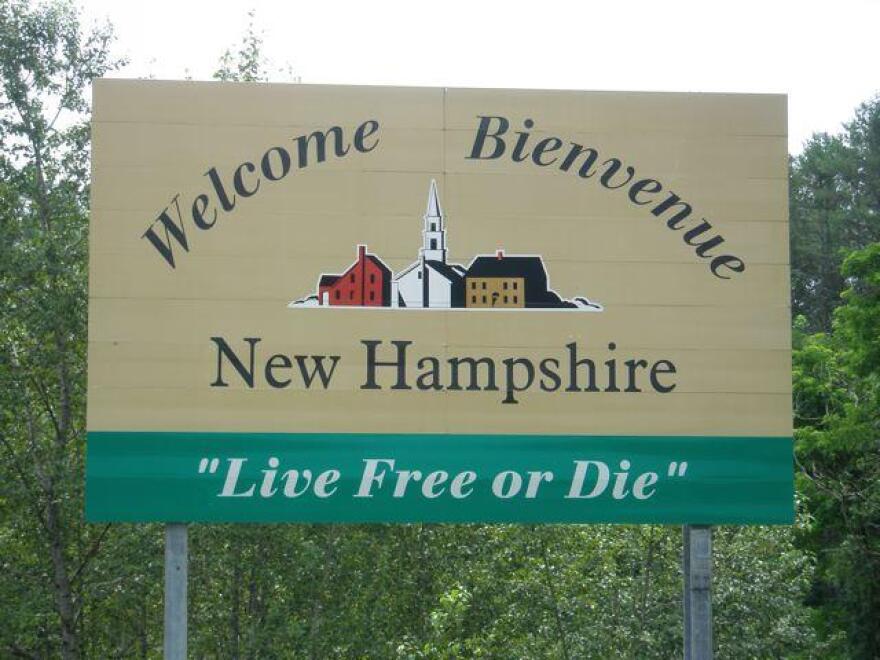
When you buy an RV through a dealer in New Hampshire, you’ll receive a 20-day temporary plate . If you go through a private sale, you can also get a temporary plate from a DMV. You’ll need to register your RV before this plate expires. New residents of the “Granite State” have 60 days to register.
Vehicle registration in New Hampshire is a two-part process. The first part is handled by the town or city clerk where you live. The second part is typically done with the state; however, your town or city clerk may be able to do this part for you.
You’ll have to register your RV in person at the clerk’s office . New Hampshire tags are renewed yearly. You will also need to have a vehicle inspection and an emissions test done as part of the RV registration process.
New Hampshire has the following minimum coverage requirements for auto insurance:
- Medical payments coverage: $1,000 per accident
In New Hampshire, you’ll have to pay registration fees to both the state and your municipality. For the state, fees are based on weight. You’ll have to contact your municipality to find out the fees they’ll charge.
When you buy an RV from a dealership in New Jersey, they’ll usually handle the registration for you. For private sales, you’ll have to register within just 10 days. New residents have 60 days to register.
You’ll have to register in person at your local Motor Vehicle Commission office. No walk-ins are accepted, so you’ll have to make an appointment . The “Garden State’s” tags are renewed yearly.
The New Jersey MVC has specific instructions on their website for how to register a motorhome , as well as a trailer . However, the process is more or less the same as for any other vehicle.
You’ll have to pass a vehicle inspection to register your RV. Inspections aren’t just a one-time thing in this state, You’ll need to do inspections every two years and every five years for new vehicles.
New Jersey has the following minimum coverage requirements for auto insurance:
RV registration fees in New Jersey are based on your vehicle’s age and weight. Fees range from $35.50 to $84.00
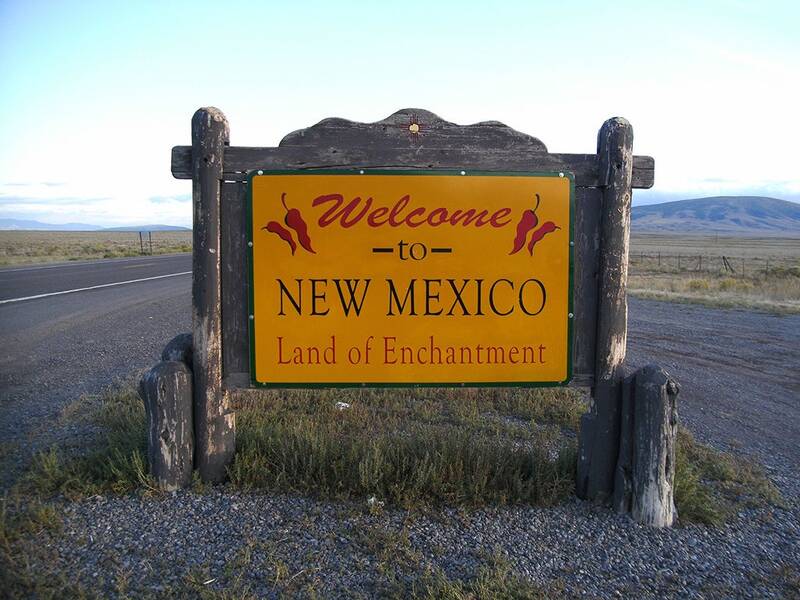
Whether your RV purchase is from a dealer or a private sale, you’ll have to complete the registration process yourself in New Mexico. Vehicles must be registered within 30 days of purchase. New residents have 60 days to register their RV in the “Land of Enchantment”.
You’ll have to register in person at your local Motor Vehicle Division office . You can register your RV for one or two years at a time.
New Mexico has the following minimum coverage requirements for auto insurance:
New Mexico RV registration fees are based on the weight and age of your vehicle. They range from $27 to $62 for one-year registrations and from $54 to $124 for two years.
If you buy your RV from a dealership in New York State, the dealer can handle the registration for you. You must register your vehicle within 180 days of your auto insurance’s effective date. New residents have 30 days to register their RV in the “Empire State.”
You’ll register in person at your local DMV and you can make a reservation to do so online. Vehicles in New York State can be registered for one or two years at a time. In NY, you’ll have to go through safety and emissions inspections as a part of the registration process. Plus, to maintain your RV registration, you have to do a new inspection every 12 months.
New York has the following minimum coverage requirements for auto insurance:
NY RV registration fees depend on the weight of your vehicle and where you live. You can estimate your registration fees using a calculator on the NY DMV website.
North Carolina
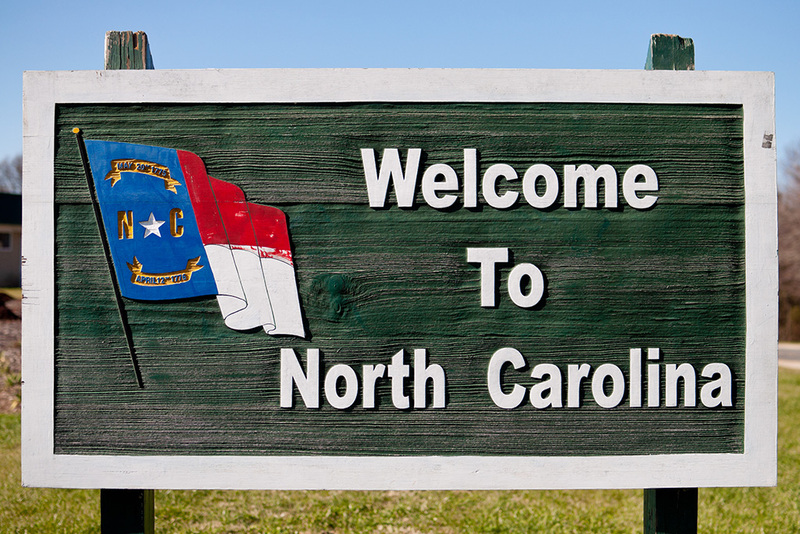
Whether you buy an RV from a dealer or a private sale in North Carolina, you’ll have to complete the registration process yourself. New residents of the “Tar Heel State” have 30 days to register.
In NC, you’ll register in person at your local DMV office . Appointments are available, but not required. North Carolina tags are renewed every year. Your RV will have to pass a safety inspection before you can register it. Plus, you’ll have to repeat the inspection for every renewal annually . Certain counties also require an emissions inspection.
North Carolina has the following minimum coverage requirements for auto insurance:
In North Carolina, you’ll pay various fees to title and register your vehicle. These will depend on the type of vehicle and where you live. You’ll also pay a highway use tax at 3% of your vehicle’s value, up to $250 max.
North Dakota
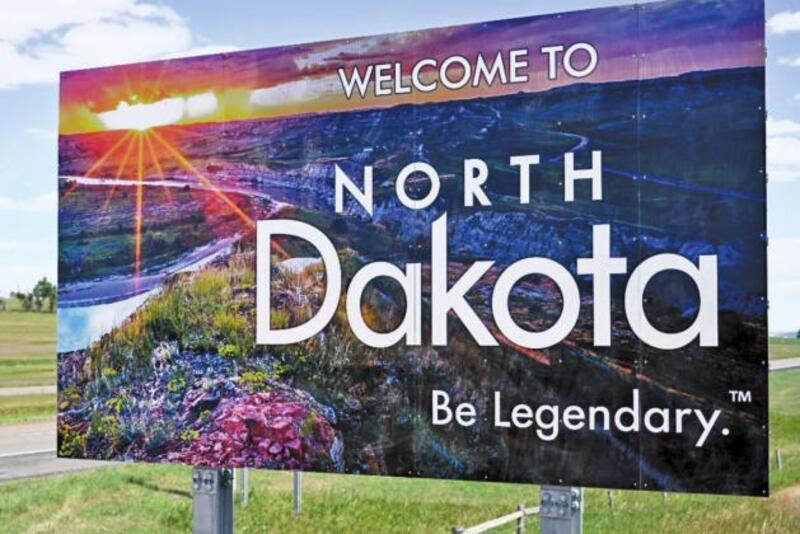
Welcome to North Dakota! In this state, you’ll have to complete your RV registration yourself whether you buy from a dealer or it’s sold through a private sale. However, if you buy from a dealer, you will receive a 75-day temporary registration.
The “Peace Garden State” doesn’t stress you out with a specific timeframe to register for new residents, but be sure to register it before heading out on your RV vacation.
Here you’ll register your RV in person at your local Department of Transportation office . North Dakota tags are renewed yearly.
North Dakota has the following minimum coverage requirements for auto insurance:
RV registration fees in North Dakota are based on the age and weight of the vehicle.
In Ohio, you’re required to register your RV yourself, regardless of the situation. New Ohio residents have 30 days to register.
You’ll register in person at your local deputy registrar license agency . RVs in the “Buckeye State” are eligible for multi-year registration for up to five years at a time. In Ohio, you may be required to complete an emissions test , depending on where you live and your RV’s model year.
Ohio has the following minimum coverage requirements for auto insurance:
The Ohio registration fee for a motorhome is $46; for trailers, this fee is based on weight. You’ll also have to pay a deputy registrar fee ranging from $5 to $15.

Whether you buy an RV from a dealer or a private sale in Oklahoma, you’ll need to complete the registration process yourself within 30 days of purchase. New “Sooner State” residents also have 30 days to register.
Registration is done in person at your local Oklahoma Tax Commission office or at your local tag agency. Oklahoma RV tags are renewed yearly.
Oklahoma has the following minimum coverage requirements for auto insurance:
Oklahoma charges a flat registration fee of $96, plus an $11 title fee or a $17 title transfer fee. You may also need to pay excise and/or sales tax based on the purchase price of your RV.
If you buy your RV from a dealership in Oregon, they can complete the registration process for you. Whether the dealership registers your rig or you do, the process should be done within 30 days of purchase. New Oregon residents also have 30 days to register.
You can register by mail or in person at your local DMV. You’ll need to make an appointment if you go in person. Oregon tags are renewed every two years.
The “Beaver State” has the following minimum coverage requirements for auto insurance:
- Personal injury protection: $15,000 per person
- Uninsured motorist coverage: $25,000 per person; $50,000 per accident for bodily injury
In Oregon, you’ll pay RV registration fees based on vehicle type, age, and gas mileage. If you’re a resident of Multnomah, Washington, or Clackamas County, you’ll also pay some extra fees.
Pennsylvania

In Pennsylvania, when you buy an RV through a dealership, they should complete the registration process for you. New Pennsylvania residents have 20 days to register.
You’ll register in person at a PennDOT office . Pennsylvania plates are renewed every year. You’ll have to complete a safety inspection and, in some cases, an emissions inspection to register your RV.
The “Keystone State” has the following minimum coverage requirements for auto insurance:
For motorhomes and trailers in Pennsylvania, registration fees are based on weight.
Rhode Island
If you buy your RV from a dealership in Rhode Island, they can handle the registration process for you. New Rhode Island residents have 30 days to register. You’re only required to title vehicles that are from 2001 and newer.
You’ll register in person at your local DMV office . You might need an appointment depending on what office you go to. Rhode Island tags are renewed every two years. You’ll need to go through a safety and emissions inspection to register your vehicle in the “Ocean State.” If you’re bringing an RV from out of state, you’ll also need to do a VIN check at your local police department.
Rhode Island has the following minimum coverage requirements for auto insurance:
- Uninsured/underinsured motorist coverage: $25,000 per person; $50,000 per accident; $25,000 of property damage coverage
RV registration fees in Rhode Island are based on the weight of your RV.
South Carolina

In South Carolina, you have to register your RV within 45 days of purchase. If you buy your RV from a dealer, they will generally take care of the registration process for you. New South Carolina residents also have 45 days to register.
You can register by mail or in person at your local DMV office . South Carolina tags are renewed every two years.
The “Palmetto State” has the following minimum coverage requirements for auto insurance:
- Uninsured motorist coverage: $25,000 per person; $50,000 per accident; $25,000 of property damage coverage
In South Carolina, you’ll pay a flat RV registration fee of $40 for a motorhome and $10 for a trailer.
South Dakota
There’s a reason you see so many South Dakota plated RVs roaming about the country (and Mexico)!
You have 45 days after purchase to register your RV in South Dakota. If you go through a dealership, they can handle this for you. New South Dakota residents have 90 days to register.
Registration is done in person at your local county treasurer’s office . South Dakota tags are renewed yearly.
The “Mount Rushmore State” has the following minimum coverage requirements for auto insurance:
In South Dakota, registration fees for RVs are based on age and weight.
Whether you buy your RV from a dealer or a private sale in Tennessee, you’ll have to complete the registration process yourself. Tennessee doesn’t give a specific timeframe to register for new residents or new purchases.
Registration is done in person at your local county clerk’s office . Tennessee tags are renewed every year.
The “Volunteer State” has the following minimum coverage requirements for auto insurance:
Tennessee charges a flat $26.50 RV registration fee . However, you may also have to pay additional fees depending on the county you live in.
If you buy an RV from a dealer in Texas, they’re required to handle the registration process on your behalf. For private sales, you’ll need to register your RV within 30 days of purchase. New Texas residents also have 30 days to register.
You’ll register your RV in person at your local county tax office . Texas tags are renewed every year. You’ll have to pass a safety inspection and in some cases an emissions inspection to register your vehicle in Texas.
The “Lone Star State” has the following minimum coverage requirements for auto insurance:
Texas also requires the following coverages, but you can reject them in writing:
- Personal injury protection: $2,500 per person
- Uninsured/underinsured motorist coverage: $30,000 per person; $60,000 per accident; $25,000 property damage coverage
To register an RV in Texas, you’ll pay $51.75 in registration fees, plus any other county fees.
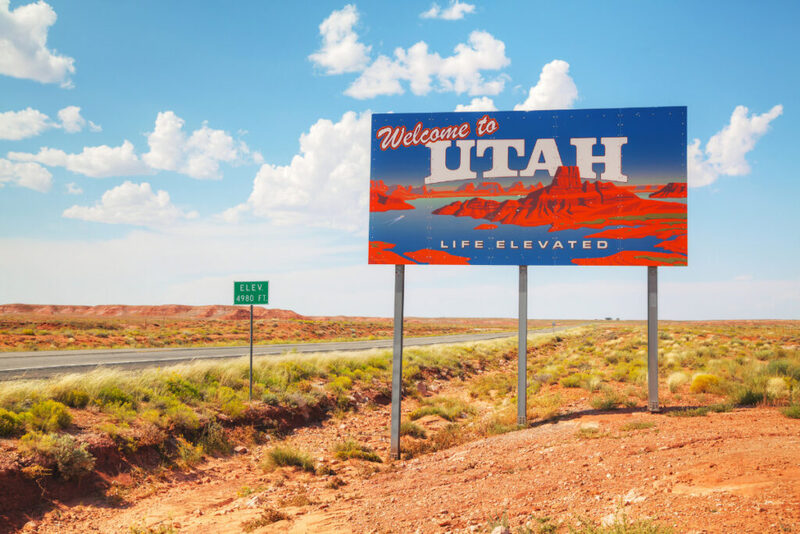
If you buy an RV from a dealership in Utah, they can handle the registration process for you. New residents to the “Beehive State” have 60 days to register.
You’ll register in person at your local DMV office and keep in mind that some offices require an appointment. Utah tags are renewed every year.
In some cases, you might need to complete a safety and/or emissions inspection to be able to register your rig in Utah.
Utah has the following minimum coverage requirements for auto insurance:
- Bodily injury liability: $25,000 per person; $65,000 per accident
- Personal injury protection: $3,000 per accident
Utah also requires uninsured/underinsured motorist coverage, but this can be rejected in writing.
In Utah, you’ll pay RV registration fees based on your vehicle type, weight, age, as well as the county you live in. You’ll need to contact the DMV to find out the exact amounts.
If you buy your RV from a dealership in Vermont, they’re required to take care of the registration process for you. New Vermont residents have 60 days to register.
You can register by mail or in person at your local DMV office . If you go in person, you’ll need to schedule an appointment . You can register a vehicle in the “Green Mountain State” for one or two years at a time.
Vermont has the following minimum coverage requirements for auto insurance:
- Uninsured/underinsured motorist coverage: $50,000 per person; $100,000 per accident; $10,000 of property damage coverage.
In Vermont, you’ll pay RV registration fees based on your vehicle’s type and what kind of fuel it uses. Fees for trailers are based on weight.
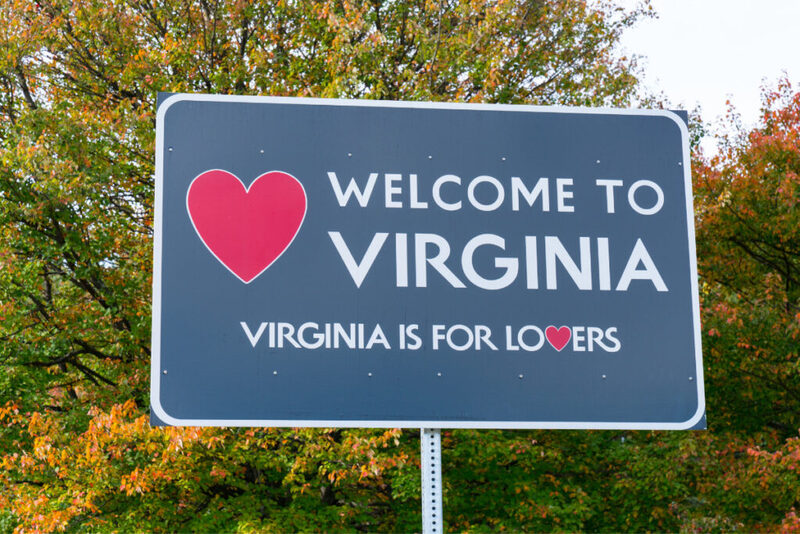
Welcome to the state for lovers! If you buy your RV from a dealership in Virginia, the dealer can complete the registration process for you. New Virginia residents have 30 days to register.
You can register your RV by mail or in person at your local DMV office . Vehicles in the “Old Dominion State” can be registered for one, two, or (in some cases) three years at a time. For some people, you may need to pass an emissions inspection to be able to register in Virginia.
Virginia has the following minimum coverage requirements for auto insurance:
RV registration fees in Virginia are based on the type and weight of your vehicle. They’ll range from $30.75 to $35.75 for motorhomes and $18 to $40 for trailers.
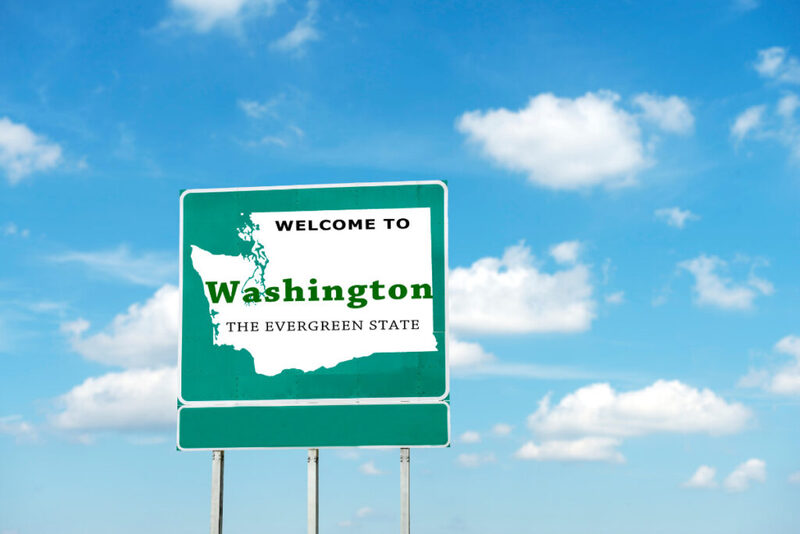
When you buy an RV from a dealership in Washington state, they’ll handle the registration process for you. For a private sale , you have 15 days to register your new-to-you RV. New to Washington residents have 30 days to register.
You can register by mail or in person at your local vehicle licensing office . Washington tags are renewed every year. In some cases, you may need to pass an emissions inspection to be able to register your rig.
The “Evergreen State” has the following minimum coverage requirements for auto insurance:
In the Evergreen State, you’ll pay RV registration fees based on the type of vehicle. You’ll also pay some other fees depending on where you live and your vehicle’s value.
Washington, DC
Whether you buy your RV from a dealer or a private sale in Washington, District of Columbia (D.C.), you’ll have to handle the registration yourself. This registration process will need to be completed within 60 days of purchase. New Washington, D.C. residents also have 60 days to register.
RV registration is done in person at a DMV Service Center . D.C. tags are renewed every year. In Washington, D.C., your RV will need to pass a vehicle inspection to be able to be registered.
“The District” has the following minimum coverage requirements for auto insurance:
- Uninsured motorist coverage: $25,000 per person; $50,000 per accident; $5,000 property damage coverage
In the District of Columbia, you’ll pay RV registration fees based on the weight of your vehicle.
West Virginia
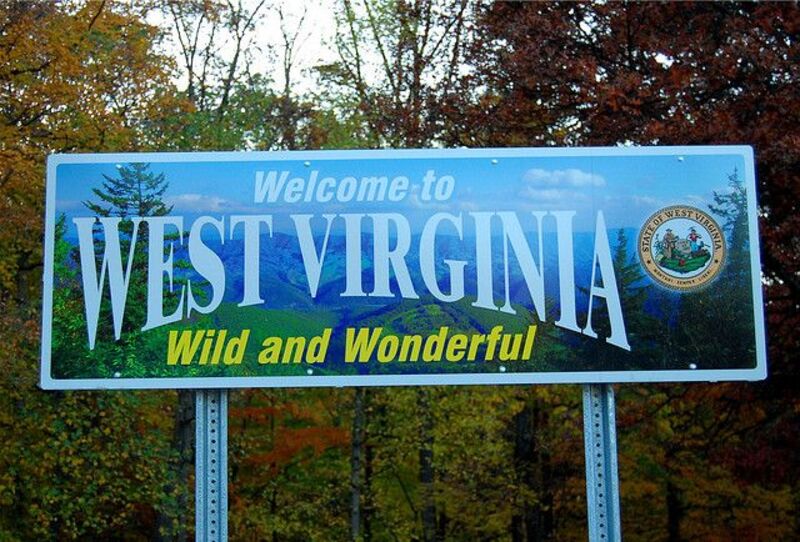
If you buy your RV from a dealer in West Virginia, they’re required to handle the registration process for you. New to West Virginia residents have 30 days to register.
In West Virginia, you’ll register your RV in person at your local DMV office . You can schedule an appointment , but it’s not required. West Virginia tags are renewed every year, but trailers are registered for three years at a time. Prior to registering, your RV will need to pass a safety inspection .
West Virginia has the following minimum coverage requirements for auto insurance:
In the “Mountain State,” you’ll pay $76.50 in registration fees for an RV. The fees for a trailer adjust according to where you fall in the three-year registration cycle.
If you buy an RV from a dealer in Wisconsin, they are required to complete the registration process for you. New Wisconsin residents should register as soon as they establish residency.
You can register online, by mail, or in-person through a licensed third party . Wisconsin does not currently handle in-person registrations at DMV service centers. Wisconsin tags are renewed every year. In some cases, you may need to complete an emissions test to be able to register.
The “Badger State” has the following minimum coverage requirements for auto insurance:
Wisconsin RV registration fees are based on the type and weight of your vehicle.
Whether you buy your RV through a dealer or a private sale in Wyoming, you’ll need to complete the registration process yourself. New Wyoming residents should register as soon as they establish residency.
You’ll register your RV in person at your local county clerk’s office . Wyoming tags are renewed every year.
The “Equality State” has the following minimum coverage requirements for auto insurance:
In Wyoming, you’ll pay RV registration fees based on the type and value of your vehicle.
Do Truck Campers Need to be Registered?
Most states don’t require truck campers to be registered or titled. The states consider them “cargo” in the pickup truck’s bed. The truck camper’s Certificate of Ownership or proper Bill of Sale has the correct information and counts as the camper’s official documentation.
If you check with your RV insurance company, your truck camper may even be covered through your truck’s insurance. We do recommend learning the details of your truck’s insurance if you go that route. If something happens, the truck camper may not have the coverage you want compared to an actual RV insurance policy.
The States below require truck campers to be registered and/or titled (Yes= +)
What is the Best State to Register a Motorhome?
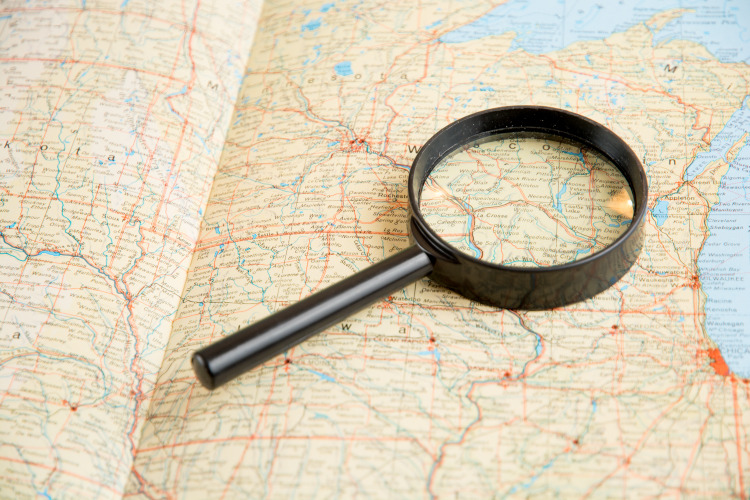
If you live in your RV full-time, you might not consider any state your permanent home. But no matter how much you travel, you’ll still need to register your RV somewhere. And in most cases, you’ll need to be a legal resident (a.k.a. domicile) of a state to register your RV there.
Some of the main things to consider when deciding where to register your RV are:
- Taxes on things like your income, investments, and personal property
- Fees to title, register, and renew your registration
- How often you renew your vehicle(s) registration
- Cost of insurance
- Requirements for establishing residency
Ideally, you want a state with low taxes and fees, affordable insurance, easy renewal (and/or a long registration period), and low requirements to become a resident.
Wherever you choose, you’ll need to return to the state occasionally for renewals and other things. It’s also good to pick a state that’s easy to get to in your RV. That means Hawaii and Alaska are off the list.
With these things in mind, there are three states that are generally considered the best to register your motorhome or travel trailer. They are Florida, Texas, and South Dakota.
The Sunshine State is a popular destination for RVers in general (especially in the winter). So it’s no surprise Florida is also a popular place to register your RV as well.
Florida is a popular choice because it has no income tax and a relatively low sales tax of 6% (This doesn’t include individual county, property, and tourist additions).
You can also renew your tags online; every other driver’s license renewal can be done online as well. Because a Florida driver’s license is good for 8 years, you’d only need to go to the DMV in-person once every 16 years.
Besides these benefits, Florida residents also get discounts on passes and tickets to Disney and other theme parks (resident vs. out-of-state). And of course, there’s also Florida’s 1,350 miles of coastline for beach lovers to enjoy.
The biggest downside to Florida is that establishing residency is not especially easy.
The “Lone Star State” is one of the most popular states for RVers and for good reason.
Texas is popular because it has no income tax or personal property tax. There is also no inheritance or estate tax. Texas registration fees are also fairly low.
Plus, Texas is also the headquarters of Escapees RV Club , one of the country’s largest RV clubs. They provide tons of services to RVers such as mail forwarding and member discounts.
You can renew your vehicle tags and driver’s license online in Texas. If you do need to return to do business in person, it’s fairly central and easy to get to. Plus, establishing residency in Texas isn’t too complicated.
The biggest downside for Texas is that you’ll be required to complete an annual vehicle inspection to renew your tags. That means you’ll need to return in person at least once a year.
The absolute best state to register your RV is generally considered to be South Dakota. This is for a few reasons.
Like Florida and Texas, South Dakota has no income tax. There is also no tax on personal property, pensions, or inheritances. South Dakota also has an extremely low sales tax of only 4.5%.
South Dakota also benefits from low registration fees and insurance rates. Plus, tags can be renewed online, as well as every other driver’s license renewal.
If you do need to return in person, South Dakota is centrally located. In fact, the geographic center of the U.S. is in South Dakota!
The best part about registering in South Dakota is how easy it is to establish residency. You can become a South Dakota resident after spending only one night there!
What Paperwork Will I Need to Register My Camper or RV?

When you register your RV, you’ll need to provide various documents and fill out certain paperwork. The exact things you’ll need depend on what state you’re registering in. However, there’s usually not a huge difference.
Let’s look at what you’ll commonly need to be able to register your RV.
The title is a document establishing you as the owner of your RV. While a title is always required to register a vehicle, titling and registration are usually handled at the same time. If you buy a vehicle in a private sale, you’ll transfer the title from the seller to yourself.
You’ll also need to provide some kind of proof of ownership, such as a bill of sale. Other states might require a Manufacturer’s Certificate of Origin.
Vehicle Registration Application Form
You’ll need to fill out a vehicle registration application to register your RV. For this form, you’ll have to provide information about your vehicle and some personal info.
Most states let you download a vehicle registration application online. In some cases, however, you can only get the form in person at a DMV.
Drivers License or Another Form of ID
You’ll need to provide some form of ID, usually a driver’s license, to prove your identity to the DMV. In some cases, you’ll need an in-state driver’s license. If you’re a new resident, update your ID first.
Proof of Insurance
You’ll need to meet your state’s insurance requirements to be able to register your vehicle. Your proof of insurance will usually be in the form of a card from your insurance company.
If your insurance company only creates electronic insurance cards, printing them out, the declaration page, or other forms may work. Ask the DMV personnel or completely read through the steps so you come fully prepared.
Proof of Passed Inspections
If you’re registering your RV in a state that does safety, emissions, or VIN inspections, you’ll need to prove you passed them. You’ll usually receive some kind of document from the office or entity that does the inspection.
For weight certifications, use the CAT Scale Locator Website or App to find an authorized scale in the area. They can weigh and give you a certified document the DMV will accept.
Odometer Disclosure Statement
An odometer disclosure statement is a document recording the mileage on the odometer at the time of sale. Odometer disclosures are generally required any time a vehicle from the model year 2010 or newer. Odometer disclosures are intended to protect you from odometer fraud .
You can obtain the necessary form at the DMV or online . The document directs you to which authority can certify the document. Some states allow notaries, police officers, certain vehicle dealership personnel, or others.
Out of State Title and Registration
If you move to a different state, you’ll usually need to provide your title and registration from the previous state you lived in. Then, you can change your title and registration to the state you now live in.
Wrapping-up RV Registration Rules by State
Whether you have a Class A motorhome, a van conversion, a fifth-wheel, or any other kind of RV, you’re going to have to register it to get on the open road. With our in-depth guide to RV registration rules in every state of the U.S.A., you’ll know how to do it, no matter where you live.
Before heading out to register your new or new-to-you RV, make sure you check all the requirements to register.
Save yourself the headache and time by bringing all the required documents such as your registration application, ID, and proof of insurance. If you’re moving, you’ll need your title and registration to update them.
The final part of registration is payment. Every state charges fees differently; different counties within the state will usually have their own fees too.
Once you’ve completed all these steps, you’ll be the proud owner of a legally titled and registered RV. Once you’re legal, there’s only one thing left to do: take your RV out on the road and start your adventure.
Related Reating:
35 biggest rv beginner mistakes to avoid, how to buy a used rv from a private seller in or out of state, 115 point rv inspection checklist (new or used), rv construction methods: which is best, best rvs and campers for beginners.
About the Author
Jennifer and Kendall are avid RVers and part-time van lifers who share their years of experience both as full-time RVers and nomads through writing.
Jenn and Kendall have explored Canada, the USA, and Mexico while RVing and living full-time in all 3 countries.
They have been fortunate to work not only as part of the RVBlogger team but also with RVLife, DIY RV, Camper Report, RV Magazine, Rootless Living, Vanlifers, and more.
They have also shared their RV experience through DashboardDrifters.com and are the founders of RVSpotDrop, a web service for full-time RVers.

1 thought on “RV Registration Rules by State”
I have a weird question. We took put a loan for an RV in WA state and all of our paperwork matches eachother. But the bank has a different RV name on their paperwork. Is the loan still valid? How do I check to see if the banks VIN matches ours without raising any glags?
Leave a Comment Cancel reply
Save my name, email, and website in this browser for the next time I comment.
When Do You Need to Title and Register Your Trailer?
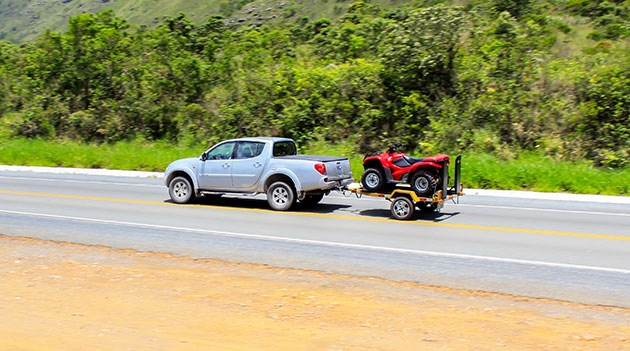
In most jurisdictions, state law stipulates that you have thirty days from the purchase to title and register your trailer. Use this as a guideline and not a rule, because state laws always vary.
Be aware that not every state titles and registers trailers; however, not titling and registering a trailer in a state that does require it will result in a penalty, which grows more severe the longer the trailer goes untitled.
What's a Trailer?
A trailer is any unit carrying property or passengers, attached to and towed by a motorized vehicle.
Typical examples of trailers include:
- Farm wagons
- Boat trailers
- Semi-trailers
- Livestock trailers
Check your state's trailer definitions ; if you're still unsure, contact your DMV .
Trailer Title and Registration Requirements
To title and register a trailer, the owner will normally have to submit:
- The properly signed title. Sometimes you can use other proofs of ownership, such as a bill of sale or a Manufacturer's Statement of Origin (MSO).
- A signed application for title and license.
- Receipts of paid personal property taxes.
- Proof of trailer insurance , depending on the state.
- All applicable title and registration fees.
Do you own and travel with a trailer? What did you have to do to title and register it?
DMV.ORG Article Categories
- Safety & Insurance
- Car & Driving Technology
- Quick Tips, Guides & DMV Basics
Recent Articles

Does My Trailer Need A License Plate? RV Towing Tips
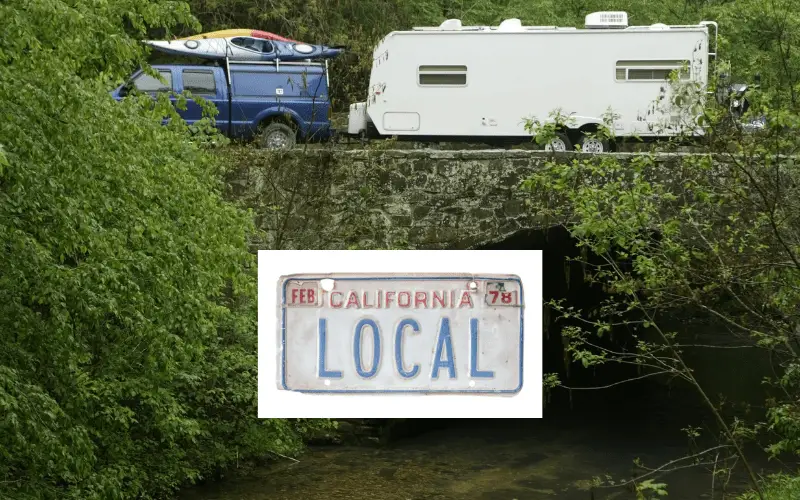
Published Date: December 29, 2020
Last Updated on April 18, 2023 by Camper Front
Most people fear that they may be in trouble if they drive a trailer without a license plate and that fear isn’t irrational. This article will help you find the information you need to know if you to answer the question, does my trailer need a license plate?
Well, in most cases, your trailer will need a license plate before you can drive it around. But there’s no general rule here. This is because each state, county, and regions all have different rules and regulations, so what applies in one state might not apply in the other.
But we’re going to do our best to explain to you everything you need to know about your travel trailer and license plate number.
However, you should keep in mind that this article isn’t in any way legal advice, you should always verify the laws and regulations of your particular county and region.
Table of Contents
Does My Trailer Need A License Plate?
The answer to this question is almost totally dependent on the state you live in. But to be on the safe end, you should assume that you need a license plate except when certain conditions are met.
Here are certain conditions for you may not need a license plate:

1. Newly Purchased Trailer
If you just newly purchased your trailer, you don’t have to fear that you may get into trouble when you drive it home without a license plate because you can instead show its bill of sale.
Any verified copy of the bill of sale can be used in place of a license plate in almost every state.
So if you decide to take your newly bought trailer for a ride and it doesn’t have a license plate yet, just ensure to have your bill of sale available on hand. Most owners even decide to place the bill on sale on the spot intended for the license plate, and you can do this too.
2. Type Of Trailer And Its Use
In some states, they give exemptions to certain types of trailers. If the trailer is going to be used for hauling farm items like vegetables, farming implements, tobacco, or even livestock, you may not need a license plate to drive it.
The same rule applies to trailers that are used to tow other vehicles known as tow dollies.
You Might Also Be Interested In : How to Get a Title For a Camper
What happens when you tow a trailer without a license plate.
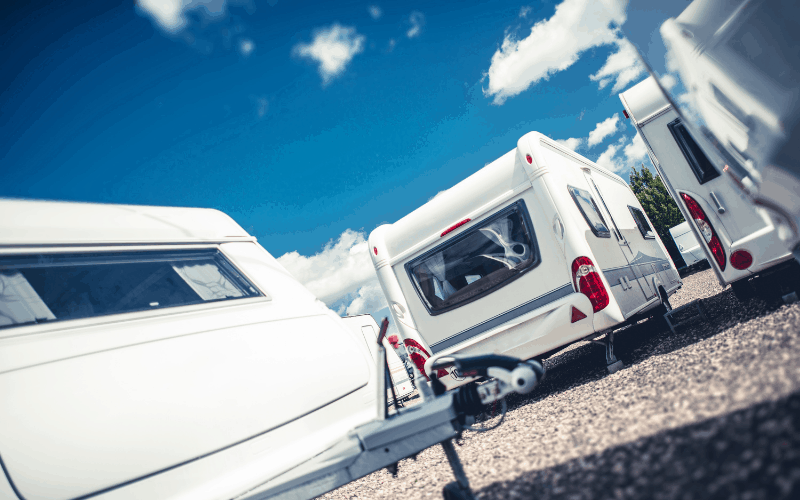
So, in the event where end up getting caught for towing a trailer without a license plate in a region where it is against the law, there are certain penalties you may end up facing.
These penalties are set in place to deter people from trying to take the risk of towing their trailers without a license plate, which happens to be something that’s consistent.
Many people may do this and get away with it but not everyone will be that fortunate and you may end up being penalized which is often the case. In such cases, the worst you can expect is a ticket.
But that depends on the officer penalizing you, some might let you go off with a warning, and some won’t.
On a side note, you should not try to replace a temporary alternative plate on the license plate spot, many people tend to do this, and are a more serious offense that can get you a large fine.
You may get away with it or you may not but the trouble it lands you with are way bigger than the stress of getting a license plate for your trailer in the first place.
It saves you a lot of heartache and stress abiding by local laws and regulations.
Other Necessary Guidelines For Travel Trailers
Aside from license plate issuance, most states also places great emphasis on other factors like lighting and brakes.
Most states demand that every trailer must have working taillights. And some even have their specific brake laws.
Many states set very strict rules when it comes to ensuring the safety of trailers traveling within their jurisdiction. Many states require that your trailer have backup safety chains, brake lights, and turn signals.
These are all accessories that fulfill specific purposes that help to ensure your safety on the road as well as the safety of other road users.
Other towing requirements that vary from state to state include weight which has an impact on the braking and the trailer size. The average legal height of a trailer is about 13 to 14 feet and not more than 8 feet in width.
You also need to ensure that your trailer’s license plate has proper lighting so it can be seen easily, this is also required by most states as well.
You Might Also Be Interested In: 6 Best Travel Trailers Under 4000 lbs
Rv towing tips.
- Always check your lights
- Although some parts of a trailer like the taillights, license plate lights, and brake lights are considered to be just the bare minimum they are very important.
- Ensuring that your brake lights are working properly will help to prevent a lot of rear collisions. Having functional tail lights helps with night visibility for those long travels which you might end up having while going on a trip
- Know your trailer’s size
- You need to know your trailer’s exact height, length, and width, as well as its exact dimensions, this will enable you to avoid potential accidents while on the road.
- A trailers height is one of the most underestimated factors, that’s why it causes lots of accidents
- You also need to be aware of how the trailer naturally follows your vehicle. Although trailers are easy to drive, you have to be extra careful when performing sharp turns or when backing up.
- Backing up is more challenging, and it’s often recommended to practice it first. You should also try to think ahead and limit situations that would need you to back up the trailer at all.
- Practice your braking
- When you tow a trailer, you would need to anticipate your stopping and start stepping on the brakes a couple of meters away from where you would want to stop that is why it is recommended that drivers keep a farther distance between their trailers and vehicles in front of them.
- Your speed also has an impact on your braking which is why most states enforce a towing speed limit of exactly 45 mph.
- If you are towing a really heavy trailer , it will need to be fitted with trailer brakes due to the excess weight.
- If you make use of tailer brakes you have to know that they tend to be far more unpredictable than vehicle brakes, most especially if they aren’t serviced that why you need to ensure there are well maintained.
But at the end of the day trailer brakes are necessary and helpful, but you shouldn’t totally rely on them. If you are towing a heavy load ensure to give yourself more time to stop even more than you think you need.
You Might Also Be Interested In : Is It Legal To Transport a Dog In An RV?
Conclusion: does my trailer need a license plate probably..
If you are a newbie to towing life, it’s no surprise that you may wonder whether you need a license plate for your trailer before you can use it.
But unfortunately, there isn’t a direct answer to that question. But, you can always check with your local authorities.

- You are here:
- Home »
- Blog »
- » Where and How To Install a Camper License Plate Holder
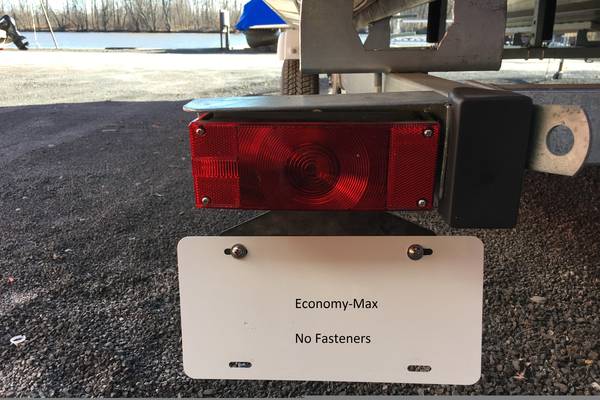
Where and How To Install a Camper License Plate Holder
- March 22, 2022 /
- RV Driving /
- By James V.
You will find as you make your way through the RV world, and life, that just about anything that is on the road needs a license. Whether needed or not, licenses add revenue and make sure you are legal with your trailer.
For many 5th wheel trailers, the license plate holder is a couple of tabs underneath the passenger side tail light. Unfortunately, you usually have to supply your own bolts to secure the license plate in position. Sometimes, the dealer will do it for you.
To learn more about license plates and RV trailers, just continue to read our article. it has the information you want to know about so you can put your license plate in the right spot.
Do RV Trailers Need License Plates?
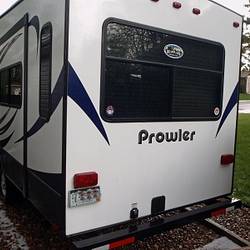
Yes, you do. However, while the regulation is the same, the registration, renewal, and other requirements will differ from state to state. You have to check with your local DOT or DMV to find out those specific regulations.
In some states, you may have your license plate for 5 years but you still have to register the trailer more often than that. This is why knowing your state’s regulation is so important.
While you don’t need to follow all the regulations for all states at the same time, you do need to follow those regulations for the state you do live in. Make the call as soon as possible to get the right information. Do not rely on strangers’ advice.
RV License Plate Holder Options
The DOT regulation is that the license plate is supposed to be illuminated at night and all hours of the night when in motion. that means any license plate holder you get cannot block any tail or other light from illuminating that license plate.
There are a variety of different designs you can get. You can use a similar plate holder that your tow vehicle has or you can use one with two holes that hold the plate in place very securely.
The holder you get will depend on your preference and if they cast a very good light. For ideas, just go to Amazon and see their selection. You can get a good idea of what will fit on your trailer and then go to a nearby store and pick up a cheap option.
Where do You Put The License Plate on a Camper Trailer?
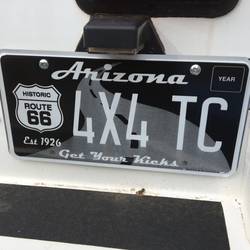
As we said, different states have different regulations. Some states have specific locations for the license plate while others will just say, ‘the rear’. For states like Pennsylvania, South Carolina, Oklahoma, New Mexico, New Jersey, New Hampshire, Indiana, Delaware, and Alabama, they do not say where the license plate should be on a trailer.
Those states only mention where it should be for the vehicle, at least on the chart we saw. All the other states required the license plate to be on the rear of the trailer, but they did not give a specific location for that placement.
Double-check with the state you live in for exact information. Plus, regulations change over the years and new ones are not always reported right away.
Trailer License Plate Location
From our research, this is fairly open when you get your new license. Most states say they simply want it on the rear of the trailer. Some trailers may already come with the license plate location already built-in, so use that location.
Other trailers may not, and it seems you have a little freedom to put the license plate anywhere on the rear of the trailer as long as it is visible, clean, free from obstructions, and well lit up.
Some owners place theirs under the driver’s side tail light while others use the passenger side or their bumper.
RV Bumper License Plate Holder
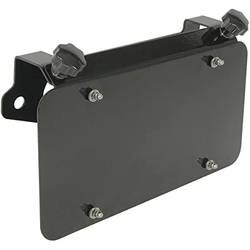
There doesn’t seem to be any regulation governing the design of the holder. Some owners have used the tabs included in their purchase while others have used similar designs to their cars and tow vehicles.
The only regulation that we have come across on this topic is that the license place needs to be well lit and not hidden. Some owners have cut those tabs off and screwed the license plate directly to their trailer. They placed it under one of their lights as well.
When the running lights are on, the license plate’s light should be on at the same time. Just double-check with your local DMV to see if your state has any further regulations governing this issue. It is best to get the information from the horse’s mouth so there is no confusion. Besides with changing regulations, it is best to be up-to-date.
RV License Plate Screws
There is no regulation governing the use of different screws. Standard nuts and bolts are the most effective and the most secure. There are different designs to them and you just need to pick the ones that you like and put them on your holder.
Some come with a slot so you need to use a flat head screwdriver. While others come smooth and you need to use your finger to hold it in place as you secure the nut. Then some owners have the bolt leg sticking out away from the trailer so it does not scratch the paint.
How you attach the screws is up to you as some owners, as we have said, use regular sharp screws and attach their license plate to the trailer itself. The key here is to make sure the screws or bolts are securely in place and won’t let the plate fall off.
License Plate Bolts For Trailer
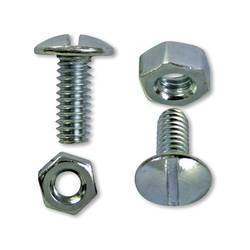
Like screws, you can get these bolts in any shape and size you deem is necessary. When you use a bolt it is vital that you use a nut. The nut makes sure everything is bolted in place and not going anywhere.
Bolts tend to be more secure than screws and should not work themselves loose when enduring the vibration of the road. There are no real regulations determining what kind of bolt you can use. You are free to use any number of them as long as they do not obstruct the numbers and letters on the plate.
What the different states say is that the license plates need to be securely fastened which gives you a lot of leeway in how you do it and what hardware you use.
RV Trailer License Plate Bracket
These come in a variety of designs and some of those designs come with their own tail light to make sure the numbers and letters can be read easily. They also come with their own hardware, in most cases, and allow you to install them just about anywhere on the rear of your trailer.
Those with lights come with their own wiring and connectors so you can connect them up to the running lights of the trailer. That way when the lights are on, the license plate light is on as well.
These brackets are found almost anywhere so your difficulty will be finding them at the right price.
How To Mount License Plate on The Trailer
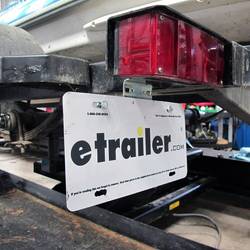
If you use the tabs provided by the brand maker, then you just need to cut the opening out. Then align the hole son the bracket with the hole son the tabs and put your bolts through both.
Once the bolts are in place, you place the nuts on the other side and tighten them up. Make sure to go nice and tight as you want them secure and not flapping in the breeze.
Other installation options would be to drill holes in your bumper and place the brackets there using the same method. There are a variety of methods you can use, so just pick the best one for your trailer design.
RV License Plate Holder Broke
This is a situation you should fix as soon as possible. With a broken license plate holder, you run the risk of losing the plate. If you lose the plate, you may get a ticket for not having a license on the rear of your trailer.
Replacement holders are easy to find so that is not going to be a problem. In the meantime, while you wait for a new holder to arrive, duct tape does wonders.
Some Final Words
Different states have different rules on this topic. It is best to talk to your local DMV office and get all the up-to-date information you can. Your state’s regulations will be accepted by the other states, so you should be fine when you cross state lines.
You do have some freedom in placement as long as the license plate is at the rear of the trailer. You also have some freedom on the holder’s design as well as the hardware holding it in place.
Source for state locations-- https://www.rvia.org/system/files/media/file/License%20Plate%20Placement%20.pdf
Related Posts
Route 81 From Connecticut To Florida (81 to 77 to 26 to 95)
RV Dinette With Seat Belts: Can You Add Seat belts To an RV?
Garden State Parkway Height Restrictions (Trucks and RVs)
Leave a Comment:

The Savvy Campers
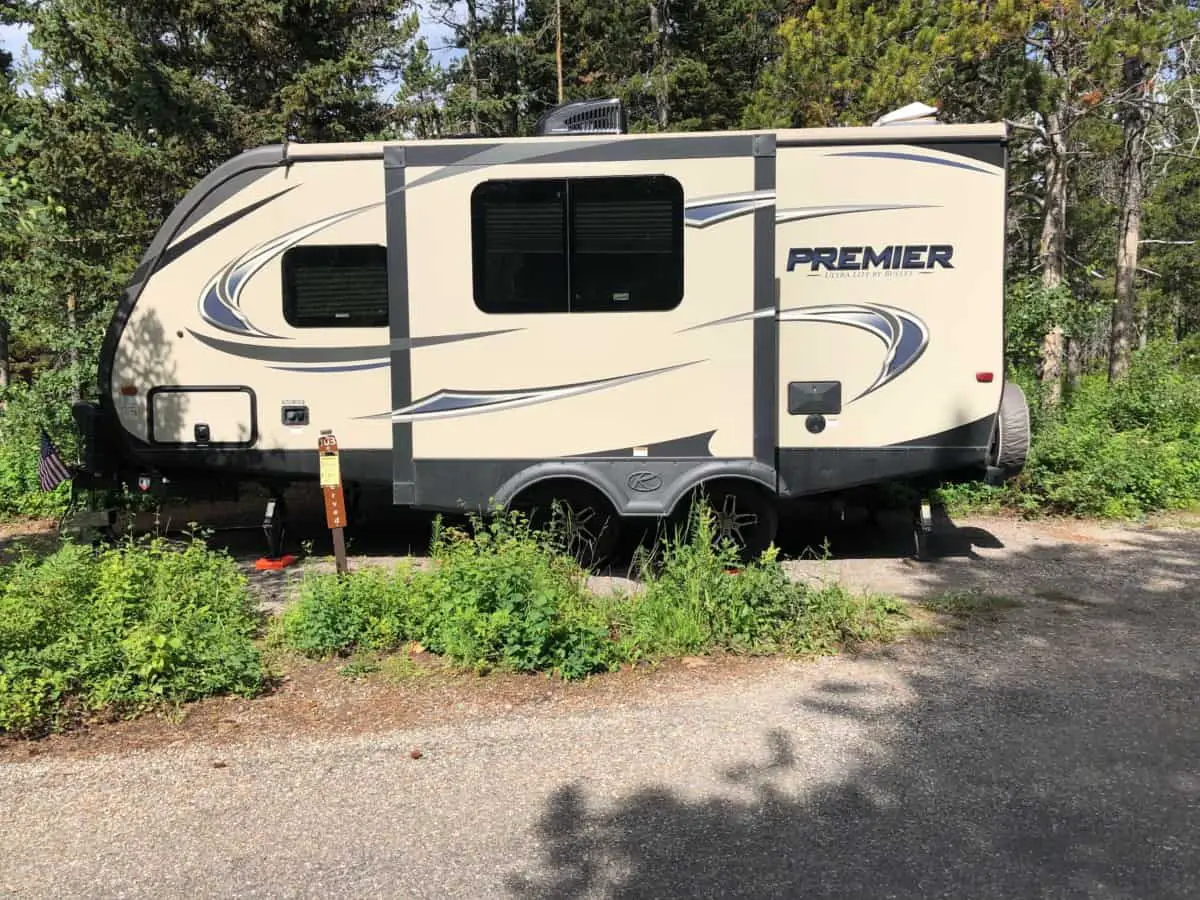
Do Travel Trailers have Titles, VINS, Odometers, Plates, and Insurance?
Does a travel trailer have a title.
Most vehicles on the road today have titles to prove ownership. Travel Trailers or RV’s are not any different.
Does a travel trailer have a title? Yes, travel trailers, RV’s, Campers, and tent trailers all will have titles. Titles are for the owners protection to prove ownership. If you financed your vehicle, your bank may hold onto the title until your loan is paid off. Titles typically are necessary for licensing your vehicle.
When buying a brand-new or used travel trailer from a dealership, it will come with a title. If you are buying a used travel trailer from an independent person, then it is best to ask for a title if they do not offer a title.
It is always a good idea to have a title because some states require a title for the travel trailer to be on the road. Also, this ensures that you did not buy a stolen travel trailer.
However, if it is a very old trailer or one that was built at home then there may not be a title. If this is the case, then you need to go to your local DMV to register and obtain a title. This process is similar to obtaining a title for a car.
The first step is to go to the DMV or go online to fill out an application. The DMV will require a copy of the bill of sale and the original title, but since you most likely do not have the original title, then you will need to provide the manufacturer’s certificate of origin.
The manufacturer’s certificate of origin (MCO) is a document stating where the travel trailer was built and by whom. This is mainly for tariff reasons. The document will state if the travel trailer was either built in the United States or not. However, if you do not have any of these documents you can still obtain a title.
Most states will allow you to have the application notarized guaranteeing you are the owner of the travel trailer or by filing a lost title application. Once this is complete, you will be able to obtain a title from the DMV. It is best to keep the title in a safe place. Once the trailer has been registered you do not need to keep the title with you. It is best to store the title in a safety deposit box or a home safe with other important documents.
Does a Travel Trailer need insurance?
In today’s day and age, it is important to have insurance on everything. A golf cart, RV, Jet Ski, motorcycle, car, etc. even if the law does not require you to. This is not only to protect other motorists but protect yourself and passengers from any liability or damages that may arise. Insurance is cheap compared to the damage that can happen with one accident.
Does a travel trailer need insurance ? Travel trailers do require insurance when there is a loan on the trailer. If the travel trailer is debt-free, depending on which state you live in, you are not required to carry insurance. For your protection, it is always recommended to carry your own insurance.
Laws vary between states and be mindful of the laws as you travel. However, it is very important to carry insurance whether or not there is a loan. This protects you and your trailer from any loss. These travel trailers are expensive and an investment. You do not want to lose the money that you have put into it.
Before you look at additional insurance, it is a good idea to look at your car insurance policy first. Some car insurances will extend the liability insurance to your travel trailer since it is being towed by your vehicle. If this is the case, you do not have to carry additional insurance on the trailer. When you look at your policy, you will see liability and UM/UIM (uninsured motorist) insurance.
Most states require you to carry liability insurance, this is if you hit someone else or the trailer gets loose and hits another car. However, it is always a good idea to carry UM/UIM. This is if someone else hits you and they do not have enough liability insurance to cover the cost of all damages or they do not carry liability insurance at all.
You can use your policy for any repairs. Some may think, I am a safe driver nothing is going to happen. But what you need to think about are the other drivers on the road.
Insurance doesn’t just cover damage when towing, it will cover damage due to a tree, water, flooding, plumbing leak, as well as other accidents or theft. Make sure to consult with your insurance agent to determine what policy is right for you.
Does a Travel Trailer have a VIN?
Yes, travel trailers do have VIN numbers. VIN stands for Vehicle Identification Number. These numbers are unique to each trailer, just like a car. They are 17 digits long and each number has a specific meaning. You will need the VIN to register and obtain a title for your travel trailer.
The VIN can be located in numerous areas of the trailer. Common areas are either on the front left side of the wheel arch, inside the trailer on a cabinet door, or on the inside of the front door of the trailer.
Most of the newer models have the VINs located on the wheel arch. Normally older models, from the 1980s, have the VIN on the front door of the trailer. However, trailers from 1981 and before were not required to have VINs. So, if you have an older model you may not have a VIN on your trailer. If you would like a VIN for your vintage trailer, you can go to your local DMV to have them issue you a new number.
Here is an example of a VIN and the meaning behind each letter and number:
VIN – 7KSBX20299H561894
7KS – Manufacturer
BX – Model Type
20 – Length of the trailer
2 – Number of axles
9 – Check Digit
9 – Year it was built (there is a nationwide guide that decodes the number)
H – Where it was built (there is a nationwide guide that decodes the letter)
561894 – The trailer’s serial number
Your VIN is important for several reasons. The most important reason is for recalls. Once your travel trailer has been registered, your information and the trailer’s VIN will be in a nationwide database. You will be contacted by the manufacturer if there are any recalls on your trailer. It is important to be aware of the recalls since the trailer is on the road. You want to make sure each recall is fixed for any safety reasons.
Another reason it is very important is for licensing, titling, and when you go to sell your trailer. This will prove this is the trailer you own without question.
Does a Travel Trailer’s, RV,s and Tent Campers need a license plate?
Yes, travel trailers, RV’s, and tent trailers do need license plates. You must register them with your local DMV and then a license plate will be issued. In order to register the trailer and receive the license plate, you will need to follow a similar process as getting the title.
You will need to go to your local DMV and complete the proper paperwork. The DMV will require a copy of the bill of sale and the original title or the manufacturer’s certificate of origin. Once you pay the tax and license plate fee, the license plate will be issued.
One reason why a license plate is issued is that there are registration fees due yearly on travel trailers just like cars. The registration and license plate allow the state to keep a record of the trailers and tax them accordingly. You will need to check with your local area regarding the amount due since there is no one set price nationwide. Fees vary from state to state.
Another reason why license plates are required is that most travel trailers block the view of the license plate of the towing vehicle. The license plate must be in view for police officers to read them.
Do Travel Trailers have odometers?
No, travel trailers do not have odometers. Since travel trailers are towed behind vehicles, odometers are not installed. However, it is always a good idea to track your mileage. This way you can easily calculate when the trailer needs servicing.
Even though travel trailers don’t have a motor, like an RV, they still need servicing like any other vehicle. If anything, you want to track mileage for the tires, brakes, and bearings. The tires are most important on the trailer because they can wear out quickly.
Since there is no odometer, there are other ways to track your mileage. One way is to track the mileage on your towing vehicle. Every time you unhitch the trailer, you can write down the mileage in a book to keep track.
A second way is to install an odometer on the trailer yourself. There is a device called a hubodometer that can attach to the axle or the hub of the tire on the trailer. The hubodometer easily calculates the mileage. Stemco hubodometer is the one that I recommend. It is guaranteed to last 500,000 miles. It easily attaches to the hubcap of the tire and is extremely durable.
Lastly, there are several Apps for smartphones that allow you to track mileage. This would be another option, similar to the odometer in the towing vehicle. You can use the App while traveling, then stop the App once the trailer has been parked.
One feature I liked about the Apps is you do not need to carry around a book to keep track of the mileage. There is a feature in the App that will allow you to keep all of the mileage information in the App.
The App that I found to be the most helpful is the Mileage Tracker by Driversnote. I found this App to be the easiest to use and offered many features. The best feature is the way it keeps track of the mileage. It keeps the mileage information on an easy-to-read report that can be converted to Word, a PDF, or Google Sheets. These documents can be transferred to your computer or printed for your records.
Happy Camping!
Be the first to be notified about FREE tips, hints, coupon codes, and email-exclusive information. All for FREE!
Related Posts:

Similar Posts
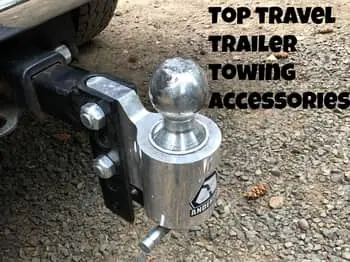
Here are the Best Accessories for Towing a Travel Trailer
When towing your trailer or driving your RV you may find that some items such as navigating, towing, backing up, etc. can be difficult. These travel trailer towing accessories below are available to make your trip even easier to get from point A to point B. I know for me towing can be stressful, these…

Can You Use Your Travel Trailer Without A Battery?
Your travel trailer came equipped with a battery, but do you really need it? Whether you’re hooked up to another power source, looking to replace your battery (or not), or are just curious, the question remains the same. Travel trailers can be used without a battery, though you will need a battery if you want…

19 Fun Camping Food Ideas That Require No Cooking
Camping throughout the year provides you with endless opportunities for adventure. Around every turn you take, a new journey awaits you. If you are wanting to spend every waking hour outdoors on hikes and soaking up the great outdoors without spending time cooking, no-cook camping recipes are the solution for you! There are an incredible…
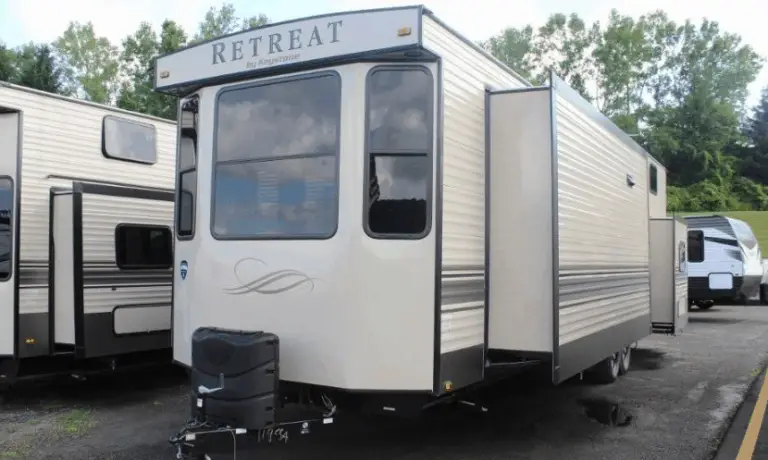
Top 5 Destination Trailers with Lofts or Bunks
Destination trailers are not built for traveling the open road for days on end. They are built to travel to a space and sit there and be used. Lots of people will purchase a recreation property such as a lake or mountain property and use a destination trailer for their housing. These trailers can simple…
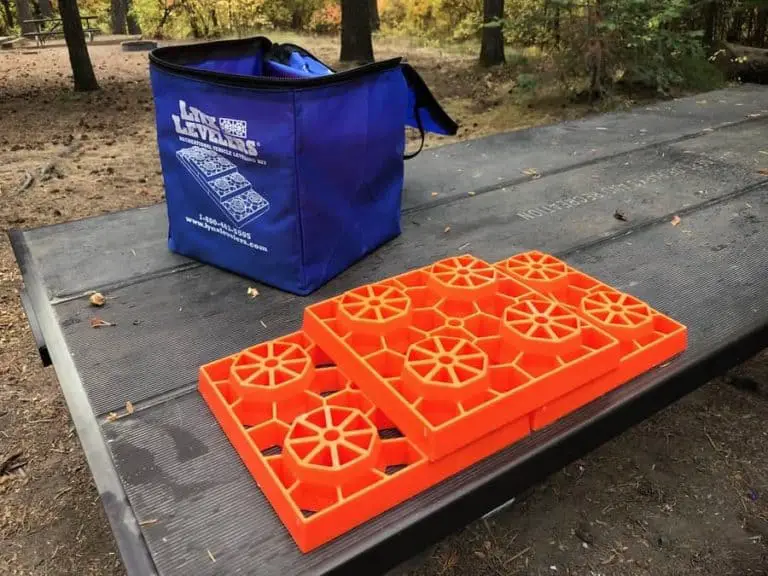
Why Do You Need Levelers For An RV?
A level setup of your RV is essential for the correct functioning of your creature comforts such as slide outs, refrigerators, and even shower drains. A good set of camper levelers and a spirit level or digital level indicator will make the level set up of your camper a quick and easy operation. The slide-outs,…
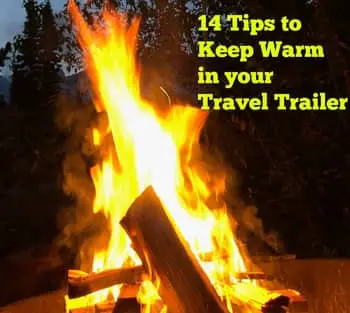
14 Tips to Keep Warm in Your Travel Trailer This Winter
There are several ways to keep warm in your travel trailer or RV in the winter; insulation, heat, clothing, and activities. All can be a great way to keep warm in the winter months while camping. To keep warm in your travel trailer, you can implement some or all of these items to have a…
Join our Newsletter to stay up to date on the latest RV topics and receive our FREE RV Inspection Cheat Sheet Today. Use this tool to inspect new or used campers you are looking at purchasing.
No thanks, I’m not interested!
For commercial vehicle customers: All services for IFTA/IRP online and in branch offices will be out of service from 5 p.m., May 2 until 8:30 a.m., May 6 for a Motor Carrier Services systems upgrade. All other customer services will not be affected. We apologize for any inconvenience.
Camper, Trailer, or RV
Driving a Camper, Trailer, or RV
If you're interested in driving a camper, trailer, or recreational vehicle, also known as an RV, you may need a Class E or F driver's license if the vehicle's gross vehicle weight is 26,001 pounds or more.
Schedule a road test Find an SCDMV branch Registering a Camper or Trailer
Only certain types of campers or trailers that attach to vehicles must be registered and receive license plates. The SCDMV can issue the following items trailer plates:
- Camper trailers
- Travel trailers
- Horse trailers
- Boat trailers
- Utility trailer
- Pole trailer
- Farm trailer
- Semitrailer
If you're interested in applying for a trailer plate, you must complete the Application for Trailer License Plate (SCDMV Form PL-010A). In order to register a trailer/camper in South Carolina, it will require the trailer/camper to be titled. In order to title the trailer/camper you are required to present the bill of sale and previous title. If the previous title does not exist, you must complete the Affidavit of Ownership for a Motor Vehicle, Trailer, or Mobile Home (Form TI-021A) and Vehicle Identification Verification for Title without a Previous Title (Form TI-021B) .
Camper/Travel/Horse Trailer
The Camper/Travel Trailer license plate is available for trailers that have living space and must be registered. This is also the same process for horse trailers that have living quarters. There is no weight requirement for this plate.
The registration fee for a camper that's towed on a vehicle is $10 every two years. You must pay property taxes on the trailer with your county before you may register the trailer.
Boat/Utility/Pole/Farm Trailer
There are two types of license plates available for the trailers listed above: permanent and biennial.
You must register your utility, pole, or farm trailer only if you're traveling out of South Carolina. If your boat trailer has an empty weight of 2,500 pounds or more, you must register it in order to use it on SC roads or out-of-state. If your boat or utility trailer is under an empty weight of 2,500 pounds, and you are not planning to travel out-of-state, then you do not need to register it.
The Utility Permanent license plate cannot be transferred between trailers. You must complete the Application for Trailer License Plate (SCDMV Form RG-010A) and pay $75. You do not have to submit a property tax receipt.
You must register your utility, pole, or farm trailer only if you're traveling out of South Carolina. If your boat trailer has an empty weight of 2,500 pounds or more, you must register it in order to use it on SC roads or out-of-state.
The Utility Trailer license plate can be transferred to another trailer you own. The Utility Trailer plate is $10. You do not have to submit a property tax receipt.
Business Customer Trailers
The Trailer license plate is available for business customers who own a semitrailer or pole, utility, or boat trailer. If you're a representative of a business, you must register these items in order to use them on South Carolina roads or out-of-state.
The Trailer plate can be transferred to another trailer the business owns. The Trailer plate is $20 every two years. You must pay property taxes on the trailer with your county before you may register the trailer.
Registering an RV
Registering a recreational vehicle, or RV, works the same as if you're registering a regular passenger vehicle . The registration fee for an RV, that you can drive without a vehicle, is $40. In order to register a trailer/camper in South Carolina, it will require the trailer/camper to be titled. In order to title the trailer/camper you are required to present the bill of sale or previous title.
Towing a Trailer without a License Plate: Legal or Not?

Wondering if it’s a good idea to tow a trailer without a license plate?
Unfortunately, there’s not a one-size-fits-all answer. Rules, regulations, and potential exceptions vary from state to state and things can get a bit confusing. This is where most of the confusion springs up.
Some people fear that they’ll encounter hefty fines or even jail time. Thankfully, you’ll find that most of the more extreme worries are unfounded.
This guide will help you find the information you need to make the right call. We’ve also included links to each states’ government resources for trailer title/registration laws.
Some legal jargon, before we dig in: This article is meant to be a helpful resource, not legal advice. Always independently verify the laws and regulations directly with your local government.
Does My Trailer Need a License Plate?
Whether or not your trailer needs a plate is almost totally dependent on the state you live in. As a rule, it’s safe to assume that a plate is required unless certain exceptions are met.
You may be exempt from a trailer license plate under these circumstances:
Exemption #1: Recently Purchased Trailer
If your trailer is newly bought, you don’t need to worry about driving it home without a license plate because you can instead show its bill of sale.
Any verified copy of the bill of sale can take the place of a license plate in just about every state.
This is why if you decide to take your tagless trailer for a ride, assuming it’s freshly purchased, don’t forget to always have your bill of sale available on hand. Some owners even decide to put it on the actual spot intended for the license plate, which also works.
Exemption #2: Trailer Use & Type
Some states, like North Carolina, for example, give exemptions to certain types of trailers. If it’s a trailer that’s used primarily for hauling items from farms like vegetables, farming implements, tobacco, or even livestock, it can be towed without a license.
The same can be said for trailers that are used to tow other vehicles (tow dollies). Even certain trailers that come from nearby states (e.g. South Carolina, where most types of trailers aren’t required to be registered) are often also given a free pass.
Trailer Registration & License Plate Laws by State
The following list includes links to government websites’ resources for all fifty states’ (and District of Columbia’s) trailer registration and license plate laws:
- Connecticut
- Massachusetts
- Mississippi
- New Hampshire
- North Carolina
- North Dakota
- Pennsylvania
- Rhode Island
- South Carolina
- South Dakota
- West Virginia
- District of Columbia
The .gov sites listed here are reputable government websites, but you should always double check that the information they provide is up-to-date.
Potential Penalties
It also wouldn’t hurt to be aware of the possible pitfalls once you end up getting caught for towing a trailer without a license plate.
This is one sure way of convincing people to avoid taking the risk of towing their trailers sans license plate, which happens to be done on a fairly consistent basis in the US.
Most just keep their fingers crossed and do get away with it, while others aren’t as fortunate which is often the case. In such scenarios, it’s likely that the worst you can expect is a ticket.
Some officers are more lenient and might let you go off with a warning, and you should consider yourself lucky if you encounter them.
Furthermore, you also shouldn’t even consider trying to replace a temporary alternative plate on it, which some people have been found guilty of doing. This could mean a more serious offense (and a larger fine). We’d like to assert that it’s surely not worth all the immense hassle it will cause.
Always err on the side of caution, taking the extra moment to ensure that you’re abiding by local laws and regulations.
Trailer Lighting
Upon taking a look at most states’ guidelines, you’ll find that most of the emphasis is placed on other factors like lighting and brakes.
It’s a given in any state, for instance, that your trailer must have working taillights. Each state also even has its own specific brake laws.
A lot of states are also stricter when it comes to ensuring the safety of trailers traveling within their jurisdiction. Most, for instance, would require you trailer to have backup safety chains, brake lights, and turn signals.
These are accessories that fulfill specific purposes that ultimately increase road safety, after all. Other towing requirements that vary in each state include weight (since it’s closely related to braking) and the dimensions of the trailer. The average height of the trailer should not exceed 13 to 14 feet and shouldn’t go beyond 8 feet in terms of width.
It’s also essential in virtually every state in the US for a trailer’s license plate to have proper lighting in order for it be easily seen.
Trailer Towing Tips to Keep in Mind
Always make sure to check the lights.
Be mindful of the parts of your trailer that are considered as bare necessities, especially the taillights, license plate lights, and brake lights.
Having properly working brake lights do well in preventing a lot rear collisions. Tail lights, on the other hand, are always important for better visibility at night, which is arguably very vital for towing trailers.
Know your trailer better
From its exact height, length, and width, being aware of your trailer’s exact dimensions will help you avoid potential accidents while on the road.
Width and length are obvious factors, but it’s surprising how often many drivers underestimate their trailer’s height when they’re in tight quarters.
It’s equally important to familiarize yourself with how the trailer naturally follows your vehicle. Oftentimes, trailers are easy to drive but you may have to be extra careful when performing turns (especially sharper ones) or when backing up.
The latter is especially challenging, and it’s often recommended to practice it first. Most experts will advice to think ahead and limit situations that would require you to back up a trailer at all.
Practice better braking
Most trailer drivers have to anticipate a longer stopping distance every time they decide to brake. This is why it’s also preferred that drivers keep a farther distance between their trailers and vehicles in front of them.
How fast you’re going also plays a huge role in braking, which is why a lot of states have enforced a towing speed limit of exactly 45 mph.
Heavier trailers even have to be fitted with trailer brakes to make up for the excess weight.
Trailer brakes tend to be far more unpredictable than vehicle brakes, though, especially if they aren’t serviced. It’s extremely important to make fresh, clean brakes a priority.
Saltwater boat trailers can have the most challenging brakes to maintain. Few things are worse for brakes than a regular saltwater dip.
Moral of the story: Trailer brakes are necessary and helpful, but you’ll always be safer if you don’t count on them. Give yourself more time to stop than you think you’ll need, especially with a heavy load.
© 2024 by Upland Coast
Username or Email Address
Remember Me
Forgot password?
Enter your account data and we will send you a link to reset your password.
Your password reset link appears to be invalid or expired.
Privacy policy.
To use social login you have to agree with the storage and handling of your data by this website. %privacy_policy%
Add to Collection
Public collection title
Private collection title
No Collections
Here you'll find all collections you've created before.
Registration is required for all non-farm trailers operating on public highways. Registration and titling requirements vary according to trailer type and weight. Most utility trailers fall into two categories:
- Manufactured (built by a trailer manufacturer)
- Homemade (built by an individual in their garage or shop)
In addition, trailers are categorized by
- Gross weights (the trailer weight plus the weight it can carry) under
- Over 4,000 lbs.
Determine the Type of Trailer You Have
Start by looking on the trailer tongue. This is where you are most likely to find the manufacturer’s name, which confirms you have a manufactured trailer. If you do not know whether the trailer is manufactured or homemade, it must be inspected by an auto theft law enforcement officer. To find the nearest inspection location with an auto theft law enforcement officer, contact your local county tax assessor-collector office or TxDMV Regional Service Center.
- Manufactured Trailers
- Assembled Trailers
- Farm Trailers
If your manufactured trailer's gross weight exceeds 4,000 lbs., it must be titled. Submit the following documents to your county tax assessor-collector office:
- A completed Application for Texas Title and or Registration (Form 130-U)
- Applicable fees
- Evidence of ownership, as defined in the table below
* The Manufacturer's Certificate of Origin (MCO) is the document that allows you to register and/or title a new trailer. This is your trailer's "birth certificate," showing its unique identification information. A trailer manufacturer is required to provide a MCO to dealers or purchasers for every vehicle it manufactures.
Note: A manufactured trailer with missing paperwork cannot be registered as a homemade trailer.
Newly assembled trailers (including farm trailers) must be titled regardless of weight. For additional information on required documents and the titling process, please visit Assembled Vehicles . Assembled trailers with a non-titled record in Texas or registration receipt from another state may continue to be non-titled. If you currently have a non-titled record, and you opt to apply for title for your assembled trailer then the documents below are required.
- Evidence of ownership:
If the assembled trailer does not have a Vehicle Identification Number (VIN), a completed Law Enforcement Identification Number Inspection (Form VTR-68A) , and Notice of Assigned or Reassigned Identification Number (Form VTR-68-N) will be required.
Vehicle Identification Number
Newly assembled trailers are required to have a VIN. To acquire a VIN for your assembled trailer, you must first have the trailer inspected by an auto theft law enforcement officer. For more information on how to obtain a VIN, contact your local TxDMV Regional Service Center.
A farmer or rancher who owns a farm trailer or farm semitrailer may obtain a distinguishing Farm Trailer license plate for a $5 fee under certain conditions provided the trailer/semitrailer only transports:
- Agricultural products,
- Farm Supplies
- Participates in equine activities or livestock shows
Titling and registration requirements for farm trailers vary. For information about all required documentation and fees, contact your county tax assessor-collector office.
Farm Trailers 4,000 lbs. or less
- Exempt from title and registration requirements if primarily used as a farm vehicle.
- Temporary additional weight receipts issued for hauling seasonal agricultural products do not affect a semitrailer's gross weight and status for titling purposes.
Farm Trailers in excess of 4,000 lbs. and no more than 34,000 lbs.
- Exempt from title requirements.
- Qualify for Farm Trailer license plate.
- May be titled at the owner's request by submitting the application with appropriate fee.
Trailers in excess of 34,000 lbs.
- Must be titled and registered with Trailer license plates.
- Do not qualify for Farm Trailer license plates.
More Information
Trailers with a gross weight exceeding 7,500 lbs. must pass an annual safety inspection .
In some cases, you may be asked to provide additional information such as:
- Weight Certificate
- Photograph of trailer
For information about all required documentation and fees, contact your county tax assessor-collector office.

State of Wisconsin
Mobile homes, recreational vehicles, boats and other trailers
- Online services
- Plate guide
- Special plates
- Motor carriers
- DMV customer service centers
First determine if you need title and/or plates. Then use the chart below to determine if your type of trailer or mobile/manufactured home is handled by WisDOT or the Department of Safety and Professional Services (DSPS) . Send the title and plate application to either DSPS or WisDOT, using the links below.
Register your boat at DNR online at gowild.wi.gov .
Do I need a title and/or plate?
Fifth wheel, travel trailers, Park Model, RV trailers or boat trailers
- Over 3,000 pounds need title and plates
- Any weight being used for hire or rental need title and plates
- Being used out-of-state, title and plates are recommended
- If purchased as real estate on a foundation, hooked up to utilities and both mobile home and land are being purchased, need title from WisDOT (no sales/use tax collected), no plate needed
Mobile homes less than 45 feet long
- For use on roadway they need title and plates
Manufactured and mobile homes greater than 45 feet long
- Contact DSPS
- Does not require plates from WisDOT
Temporary undercarriage for transporting manufactured homes
- Does not need a title
- Must display a Transferable Trailer license plate registered to the transporter. The transferable trailer plate should be applied for at a weight that will cover the total weight of the undercarriage plus the load.
Who handles your application:
vehicle definitions.
- Wis Stat. 340.01(6m) - Camping trailer
- Wis Stat. 340.01(18m) - Fifth-wheel recreational vehicle
- Wis Stat. 340.01(48r) - Recreational vehicle
- Wis Stat. 101.91 (2) - Manufactured home
- Wis Stat. 101.91 (10) - Mobile home
For applications that need to be submitted to DSPS, find the appropriate form(s) at: Information on transactions involving manufactured/mobile homes .
If you have any questions, contact:
Department of Safety and Professional Services P.O. Box 8935 Madison, WI 53708-8935 Phone: (608) 266-2112 (option 3) Email: [email protected]

Trailer Registration
A trailer can be defined as a vehicle without motor power designed for carrying property or passengers entirely on its own structure and that is drawn by a motor vehicle, including tow dollies and converter gear (§ 46.2-100 ).
Trailers can be registered annually, bi-annually or permanently. The trailer registration fee is based on the gross weight of the trailer and the registration period selected. Insurance coverage for trailers depends on the insurance coverage of the vehicle pulling the trailer.
Permanent License Plates for Trailers
- Permanent license plates are available for all private, for-hire and rental trailers, regardless of their weight, for a one-time fee.
- A registration card will be issued for a trailer with permanent plates.
- The license plate will not have a month and year decal unless it is on a rental trailer, nor will it have a month or year expiration. Plates are embossed with the word "Permanent".
- For trailers that have a gross weight of 4,000 pounds or less, you may choose a full size or small (motorcycle size) permanent license plate.
- Permanent trailer plates for rental trailers will display an orange decal with a white "R" to designate the trailer as a rental.
- There is no additional registration fee for as long as you own the trailer. If ownership changes new plates will have to be purchased.
- To order permanent plates, complete an "Application for Registration" ( VSA-14 ) and check "permanent" for registration type.
- Personalized messages are available for an additional one-time fee.
- Permanent plates are neither transferable nor refundable.
- If your permanent plate is lost, mutilated or illegible it can be replaced for a fee. (§ 46.2-692 )
Additional Information
- Virginia Safety Inspection Program

An official website of the Washington state government
The .gov means it’s official. A .gov website belongs to an official government organization in the United States.
The site is secure. The https:// ensures that you are connecting to the official website and that any information you provide is encrypted and transmitted securely.
Intermittent-use trailer plates
Get information for trailer and plate requirements, fees, and how to submit your payment and application for intermittent-use trailer plates.
- Trailer and plate requirements
- Find out the fees
- Submit your payment and application
- Using restored Washington (WA) license plates
- Update your Good-to-Go! account, if you have one
1. Trailer and plate requirements
- Must be registered in WA
- A restored plate that was issued by us the year the intermittent-use trailer was manufactured
- Must be in good working order
- Have a scale weight of 2,000 pounds or less
- Club activities, exhibitions, tours, and parades
- Occasional pleasure use
- Rent them to the public - personal use only
- Use them for commercial or business purposes
- They can only be used on the trailer they were purchased for
- Install the plates on the rear of the trailer
2. Find out the fees
- Standard plates initial fee: $20.75
- Restored plates initial fee: $43.75
- Plus registration fee: $187.50
- Plus other applicable fees
Contact a vehicle licensing office to find out the total fees.
3. Submit your payment and application
Mail your payment and Specialty License Plate Application to:
Special Plate Unit Department of Licensing PO Box 9043 Olympia, WA 98507-8500
4. Using restored Washington (WA) license plates
- You can use restored WA plates instead of Collector Vehicle plates.
- The restored plate must be from the same year that the vehicle/trailer was manufactured.
- The plates must be restored to their original design. You can’t use reproductions.
- For more information, see restored plates .
5. Update your Good To Go! account, if needed
If you have a Good To Go! electronic tolling pass, be sure to update the contact information on your account with the Department of Transportation:
- Online: www.wsdot.wa.gov/goodtogo/
- By phone: 866.936.8246
Need additional help? Here's how to contact us:

IMAGES
VIDEO
COMMENTS
A few rare exceptions and state exemptions allow you to tow your trailer on a public road without a license plate. Most of the time when you purchase a new trailer it won't have a license plate. Most dealerships will give you a temporary plate or a sticker to hang in the rear window that notes the date of purchase and the reason for the ...
Utility trailers are usually open-topped trailers used to haul small loads. They can range in size and shape. Whether a utility trailer needs a license plate depends on each state. What you're hauling can also affect whether you need a license plate. For example, in some states, trailers used for farming may not require a plate.
Registration fees are based on vehicle type and weight: $17 for motorhomes under 3,000 pounds. $25 for motorhomes between 3,001 and 4,500 pounds. $30 for motorhomes over 4,500 pounds. Trailers are registered permanently for a flat $36 fee. There is also a $2.50 validation decal fee and a $10 title fee.
Try the Trailers.com free look-up to see what the laws are in your state for trailers. Don't get a ticket by breaking the law! Visit us online at Trailers.com or call today toll free 855-887-2453.
Trailer Title and Registration Requirements. To title and register a trailer, the owner will normally have to submit: The properly signed title. Sometimes you can use other proofs of ownership, such as a bill of sale or a Manufacturer's Statement of Origin (MSO). A signed application for title and license. Receipts of paid personal property taxes.
The average legal height of a trailer is about 13 to 14 feet and not more than 8 feet in width. You also need to ensure that your trailer's license plate has proper lighting so it can be seen easily, this is also required by most states as well. You Might Also Be Interested In: 6 Best Travel Trailers Under 4000 lbs.
How To Mount License Plate on The Trailer. If you use the tabs provided by the brand maker, then you just need to cut the opening out. Then align the hole son the bracket with the hole son the tabs and put your bolts through both. Once the bolts are in place, you place the nuts on the other side and tighten them up.
Yes, travel trailers, RV's, and tent trailers do need license plates. You must register them with your local DMV and then a license plate will be issued. In order to register the trailer and receive the license plate, you will need to follow a similar process as getting the title.
If your boat or utility trailer is under an empty weight of 2,500 pounds, and you are not planning to travel out-of-state, then you do not need to register it. The Utility Permanent license plate cannot be transferred between trailers. You must complete the Application for Trailer License Plate (SCDMV Form RG-010A) and pay $75.
Does not allow a trailer or secondary cargo extension to be attached to it; Collector vehicle license plates. For qualifying travel trailers that are at least 30 years old and operated primarily as a collector vehicles, you may choose to apply for Collector Vehicle plates. Related laws. RCW 46.04.126; RCW 46.17.380; RCW 46.17.375
Exemption #1: Recently Purchased Trailer. If your trailer is newly bought, you don't need to worry about driving it home without a license plate because you can instead show its bill of sale. Any verified copy of the bill of sale can take the place of a license plate in just about every state. This is why if you decide to take your tagless ...
Farm Trailers in excess of 4,000 lbs. and no more than 34,000 lbs. Exempt from title requirements. Qualify for Farm Trailer license plate. May be titled at the owner's request by submitting the application with appropriate fee. Trailers in excess of 34,000 lbs. Must be titled and registered with Trailer license plates.
Does not require plates from WisDOT; Temporary undercarriage for transporting manufactured homes. Does not need a title; Must display a Transferable Trailer license plate registered to the transporter. The transferable trailer plate should be applied for at a weight that will cover the total weight of the undercarriage plus the load. Who ...
For trailers that have a gross weight of 4,000 pounds or less, you may choose a full size or small (motorcycle size) permanent license plate. Permanent trailer plates for rental trailers will display an orange decal with a white "R" to designate the trailer as a rental. There is no additional registration fee for as long as you own the trailer.
Standard plates initial fee: $20.75. Restored plates initial fee: $43.75. Plus registration fee: $187.50. Plus other applicable fees. Contact a vehicle licensing office to find out the total fees. 3. Submit your payment and application. Mail your payment and Specialty License Plate Application to: Special Plate Unit.
Beginning on May 7, 2025, travelers won't be able to board a domestic flight, access certain federal facilities or enter a nuclear power plant unless their driver's license or ID has REAL ID's ...
Moscow Police Confiscate Realistic Batmobile Because It Didn't Have A License Plate ...
Select the department you want to search in ...
I am planning to travel to Western Europe this summer and am currently looking for good flight deals. I found a good price to Moscow and I understand I can fairly cheaply travel to Germany from there. I don't plan to visit Moscow, just transfer out. If I stay in the terminal do I need a transit visa for Russia? Edit: Looks like I do according ...
Amazon.com: Moscow Watchdog Dog My best friend Chrome Metal License Plate Frame Tag Border : Everything Else